Federal Court of Australia
Australian Securities and Investments Commission v General Commercial Group Pty Ltd [2023] FCA 24
ORDERS
DATE OF ORDER: |
THE COURT DECLARES THAT:
1. The first respondent contravened:
(a) section 47(1)(m) of the National Consumer Credit Protection Act 2009 (Cth) (the Credit Act) by reason of a contravention of its obligation under reg 11A(2) of the National Consumer Credit Protection Regulations 2010 (Cth) (the Credit Regulations) from 6 April 2019 to take reasonable steps to cooperate with the Australian Financial Complaints Authority (AFCA) with respect to AFCA complaint number 673708, being the complaint to AFCA by Mr Michael and Mrs Renee Ashton of 14 October 2019;
(b) section 47(1)(m) of the Credit Act by reason of a contravention of its obligation under reg 11A(2) of the Credit Regulations from 6 April 2019 to take reasonable steps to cooperate with AFCA with respect to AFCA complaint number 627350, being the complaint to AFCA by Ms Aroha Webby and Mr Curtis Pokai on or around 13 March 2019;
(c) section 47(1)(a) of the Credit Act by breaching its obligation to do all things necessary to ensure that the credit activities authorised by its Australian Credit Licence were engaged in efficiently, honestly and fairly, through its conduct in:
(i) attempting to rely on the settlement agreement dated 29 July 2019 between the second respondent and Mr and Mrs Ashton in order to claim to AFCA that AFCA complaint number 673708 had been resolved and was therefore outside of AFCA’s jurisdiction;
(ii) threatening Mr and Mrs Ashton with legal proceedings unless they withdrew AFCA complaint number 673708; and
(iii) commencing proceedings in the Queensland Civil and Administrative Tribunal, through its agent Miravo Pty Ltd, against Mr and Mrs Ashton, seeking damages alleged to have occurred as a consequence of AFCA complaint number 673708.
2. The second respondent contravened:
(a) section 47(1)(m) of the Credit Act by reason of a contravention of its obligation under reg 11A(2) of the Credit Regulations from 6 April 2019 to take reasonable steps to cooperate with AFCA with respect to AFCA complaint number 613517, being the complaint to AFCA by Mr and Mrs Ashton of 9 January 2019;
(b) section 47(1)(m) of the Credit Act by reason of a contravention of its obligation under reg 11A(2) of the Credit Regulations from 6 April 2019 to take reasonable steps to cooperate with AFCA with respect to AFCA complaint number 626243, being the complaint by Ms Webby and Mr Pokai initially made to the Credit and Investments Ombudsman (reference number 18/4337) and then transferred to AFCA in or around December 2018;
(c) section 47(1)(a) of the Credit Act by breaching its obligation to do all things necessary to ensure that the credit activities authorised by its Australian Credit Licence were engaged in efficiently, honestly and fairly, through its conduct in:
(i) entering into the settlement agreement with Mr and Mrs Ashton on 29 July 2019 in order to resolve AFCA complaint number 613517; and
(ii) notwithstanding that settlement agreement, subsequently commencing proceedings against Mr and Mrs Ashton in the Queensland Civil and Administrative Tribunal, through its agent Miravo Pty Ltd, seeking damages alleged to have occurred as a consequence of AFCA complaint number 613517.
3. The third respondent contravened s 47(1)(a) and s 47(1)(m) of the Credit Act by reason of his involvement in the contraventions of those sections by the first respondent.
4. The fourth respondent contravened s 47(1)(a) and s 47(1)(m) of the Credit Act by reason of his involvement in the contraventions of those sections by the second respondent.
THE COURT ORDERS THAT:
1. Pursuant to s 167 of the Credit Act, the first respondent pay a pecuniary penalty in respect of the contraventions in declaration 1 in the amount of $50,000.
2. Pursuant to s 167 of the Credit Act, the second respondent pay a pecuniary penalty in respect of the contraventions in declaration 2 in the amount of $50,000.
3. Pursuant to s 167 of the Credit Act, the third respondent pay a pecuniary penalty in respect of the contravention in declaration 3 in the amount of $30,000.
4. Pursuant to s 167 of the Credit Act, the fourth respondent pay a pecuniary penalty in respect of the contravention in declaration 4 in the amount of $20,000.
5. Pursuant to s 177 of the Credit Act, the first respondent is restrained from engaging in credit activity (within the meaning of s 6 Credit Act) (credit activity) for a period of 12 months from the date of this Order.
6. Pursuant to s 177 of the Credit Act, the second respondent is restrained from engaging in credit activity for a period of 12 months from the date of this Order, other than:
(a) collecting payments on loans currently outstanding; and
(b) engaging an independent third party to undertake collection activity in relation to any currently outstanding loan that falls into default.
7. Pursuant to s 177 of the Credit Act, the third respondent is restrained from carrying on any business engaging in credit activity, or being involved in the carrying on by another person of any business engaging in credit activity, for a period of 12 months from the date of this Order.
8. Pursuant to s 177 of the Credit Act, the fourth respondent is restrained from carrying on any business engaging in credit activity, or being involved in the carrying on by another person of any business engaging in credit activity, for a period of 12 months from the date of this Order other than continuing to act as responsible manager of the second respondent in connection with any credit activities undertaken by the second respondent pursuant to orders 6(a) and 6(b).
9. The respondents pay the applicant’s costs of the proceeding, to be taxed if not agreed.
Note: Entry of orders is dealt with in Rule 39.32 of the Federal Court Rules 2011.
DOWNES J:
1 In this proceeding, the Australian Securities and Investments Commission (ASIC) contends that the first respondent, General Commercial Group Pty Ltd (formerly known as Urban Commercial Group Pty Ltd) and the second respondent, Eden Capital (Australia) Pty Ltd (formerly known as Southside Lending Services Pty Ltd) contravened ss 47(1)(a) and 47(1)(m) of the National Consumer Credit Protection Act 2009 (Cth) (Credit Act) during the period between 22 August 2018 to 12 November 2020.
2 ASIC also contends that the third respondent (Mr Dale Heremaia) and the fourth respondent (Mr Benjamin Heremaia) contravened those sections of the Credit Act by reason of their involvement in the contraventions, respectively, of Urban and Eden.
3 ASIC seeks declarations of contraventions, pecuniary penalty orders and injunctions against each of the respondents.
4 By a Statement of Agreed Facts and Admissions filed on 20 September 2022, the respondents have admitted certain facts and the alleged contraventions. The parties have agreed, subject to the Court’s concurrence, as to the declarations to be made, the amounts of pecuniary penalties to be imposed, and that injunctions should be granted and the terms of those injunctions.
5 It has therefore not been necessary to resolve any contested questions of fact or law.
6 The Statement of Agreed Facts is annexed to these reasons. For this reason, only particular aspects of the relevant facts will be referred to in these reasons.
7 For the reasons below, the declarations sought by the parties will be made. Further, for the reasons below, I am satisfied that the agreed pecuniary penalties are appropriate, and that it is also appropriate to grant the injunctions, with minor modifications.
Overview
8 Urban and Eden each held an Australian Credit Licence issued pursuant to Part 2.2 of the Credit Act and were members of the Australian Financial Complaints Authority (AFCA) external dispute resolution scheme (AFCA Scheme).
9 Mr Dale Heremaia was an employee of Urban. He was also the sole director and shareholder of Urban until early January 2020.
10 Urban’s business included providing advice to consumers about obtaining home financing in circumstances where those consumers may not have had sufficient funds for a deposit. This advice typically involved recommending a loan to be arranged by Urban.
11 Eden’s business included providing the initial loans arranged by Urban on behalf of consumers.
12 Mr Benjamin Heremaia was an employee and the sole director of Eden. He was also the sole shareholder of Eden until early January 2020.
13 From around January 2020, both Urban and Eden became wholly owned subsidiaries of Miravo Pty Ltd.
14 From January 2020, Mr Benjamin Heremaia was the sole director and shareholder of Miravo. Miravo did not carry on any business in its own right.
15 This proceeding concerns the actions taken by Urban and Eden with respect to complaints which were made to AFCA about them by certain consumers, namely Mr Michael Ashton and Mrs Renee Ashton, and Ms Aroha Webby and Mr Curtis Pokai.
16 Based on the facts in the Statement of Agreed Facts, the respondents admit that Urban and Eden contravened s 47(1)(m) of the Credit Act, by reason of a contravention of the obligation under reg 11A(2) of the National Consumer Credit Protection Regulations 2010 (Cth) (Credit Regulations) to take reasonable steps to cooperate with AFCA in respect of the complaints. Among other matters, this involved failing to provide documents sought by AFCA with respect to the complaints, commencing proceedings in the Queensland Civil and Administrative Tribunal (QCAT) against Mr and Mrs Ashton and an AFCA staff member, and uncooperative communications with AFCA.
17 Urban and Eden further admit that they contravened the obligation imposed by s 47(1)(a) of the Credit Act to do all things necessary to ensure that the credit activities authorised by their respective Australian Credit Licences were engaged in efficiently, honestly and fairly. This included Urban wrongly attempting to rely upon a settlement agreement to which it was not a party.
18 Finally, Mr Dale Heremaia and Mr Benjamin Heremaia admit that they contravened ss 47(1)(a) and 47(1)(m) of the Credit Act by reason of their involvement in the contravention of those sections by Urban and Eden respectively.
Relevant legislation
19 Sections 47(1)(a) and 47(1)(m) of the Credit Act relevantly provide:
47 General conduct obligations of licensees
General conduct obligations
(1) A licensee must:
(a) do all things necessary to ensure that the credit activities authorised by the licence are engaged in efficiently, honestly and fairly; and
…
(m) comply with any other obligations that are prescribed by the regulations.
20 Since 13 March 2019, ss 47(1)(a) and 47(1)(m) have been civil penalty provisions: s 47(4).
21 Regulation 11A of the Credit Regulations, which took effect from 6 April 2019, relevantly provides:
11A Obligations of licensees—cooperation with AFCA
(1) For the purposes of paragraph 47(1)(m) of the Act, a licensee must comply with the obligations in subregulation (2).
(2) The licensee must take reasonable steps to cooperate with AFCA in resolving any complaint under the AFCA scheme to which the licensee is a party, including by:
(a) giving reasonable assistance to AFCA in resolving the complaint; and
(b) identifying, locating and providing to AFCA any documents and information that AFCA reasonably requires for the purposes of resolving the complaint; and
(c) giving effect to any determination made by AFCA in relation to the complaint.
22 It follows that failure by a licensee to comply with reg 11A is a breach of s 47(1)(m) of the Credit Act.
23 Section 169 of the Credit Act provides that a person who is involved in a contravention of a civil penalty provision is taken to have contravened the provision. Relevantly, “involved in” is defined by s 5(1) of the Credit Act and includes where a person has procured the contravention, or has been in any way, by act or omission, directly or indirectly, knowingly concerned in or party to the contravention.
Contraventions by Urban
Ashtons
24 In around April and May 2018, Urban provided advice to Mr and Mrs Ashton which resulted in them signing a loan agreement with Eden.
25 On 8 January 2019, Mr Ashton lodged an online complaint with AFCA in relation to the loan agreement with Eden (Ashton Eden Complaint). The Ashton Eden Complaint was ultimately resolved in July 2019 by a settlement agreement between Mr and Mrs Ashton and Eden which effectively waived the remaining balance of the loan.
26 On 11 October 2019, Mr and Mrs Ashton made a complaint to AFCA about the broking services provided to them by Urban (Ashton Urban Complaint).
27 On 4 November 2019, Mr Dale Heremaia sent an email to AFCA in relation to the Ashton Urban Complaint claiming that the complaint had been resolved by the settlement agreement, notwithstanding that Urban was not party to that agreement.
28 On 15 November 2019, Mr Dale Heremaia sent an email to Mr Ashton on behalf of Urban:
Dear Mr Michael Ashton and Mrs Renee Ashton
We have been advised by AFCA that you wish to continue with your complaint against this company despite signing a complaint resolution agreement to the contrary.
Please be advised that as a company we will not be renewing our membership of AFCA and will therefore no longer be bound by it’s [sic] rules or decisions. We will then be free to proceed with legal action to recover the costs we have incurred as well as the damages we have suffered as a result of your actions and breach of agreement.
This amount currently stands at approximately $9,750.
If you wish to withdraw your complaint we will honour our current commitment to AFCA and take no further action. If not, we will commence legal proceedings to recover the debt.
…
29 On 31 December 2019, 14 January 2020, 12 February 2020, 17 February 2020 and 21 February 2020, AFCA requested documents and information from Urban in relation to the Ashton Urban Complaint. Urban did not provide the documents and information requested by AFCA. Rather, by correspondence on 20 January 2020, 12 February 2020, 17 February 2020, 21 February 2020 and 25 February 2020, Urban refused to provide the requested documents and information. The failure to provide documents and information requested by AFCA amounts to a failure to take reasonable steps to cooperate with AFCA in resolving this complaint.
30 On 25 May 2020, AFCA made a recommendation with respect to the Ashton Urban Complaint, which was communicated to Urban on 27 May 2020. The recommendation was that Urban pay to Mr and Mrs Ashton the amount of $10,737.71.
31 On 3 June 2020, Miravo commenced proceedings in the QCAT seeking $25,000 in damages against Mr and Mrs Ashton purportedly based, in part, on the AFCA recommendation amount (Ashton proceedings). On 15 June 2020, AFCA sent correspondence to both Urban and Eden reminding each of them that commencement of the Ashton proceedings was prohibited under the AFCA Rules (being the AFCA Complaint Resolution Scheme Rules) and requiring confirmation that the proceedings had been withdrawn.
32 On 31 July 2020, AFCA issued a determination in relation to the Ashton Urban Complaint requiring Urban to pay $11,492.71 to Mr and Mrs Ashton (Ashton Determination). Following numerous attempts to obtain payment pursuant to the Ashton Determination, the sum was only paid on 25 May 2022, being approximately 10 months after these proceedings were commenced on 22 July 2021.
33 The failure by Urban to pay the Ashton Determination amount constituted a failure to take reasonable steps to cooperate with AFCA in resolving that complaint, such failure being aggravated by the length of time it took Urban to pay.
34 Whilst the Ashton Urban Complaint was progressing, AFCA was also communicating with Urban in respect of an AFCA investigation which concerned matters arising from the Ashton Urban Complaint, such as the attempt to rely on the settlement agreement and the failure to respond to information requests. Urban was informed about these matters on 28 April 2020. The AFCA case manager for this investigation was Ms Dalia Ismaiel.
35 Urban’s response to these matters was sent by Mr Dale Heremaia to AFCA on 25 May 2020, which included the statement that:
Ms Ismaiel’s efforts to impune [sic] our reputation and to commence action threatening our business and the livelihood of its stakeholders is inappropriate and unacceptable. We will be commencing legal proceedings against Ms Dalia Ismaiel. She may think she has immunity, we will be seeking to test that in Court.
36 On 1 June 2020, Urban brought proceedings in the QCAT against Ms Ismaiel personally seeking $25,000 in damages (Ismaiel proceedings).
37 On 18 August 2020, AFCA’s legal representatives wrote to Mr Dale Heremaia on behalf of Urban noting that commencement of the Ismaiel proceedings was contrary to the AFCA Rules and requiring that these proceedings be withdrawn. On 3 November 2020, Urban submitted a notice of withdrawal of the application in the Ismaiel proceedings and, on 27 August 2021, the Ismaiel proceedings were dismissed by the QCAT.
Webby and Pokai
38 On 13 March 2019, AFCA sent an email to Urban attaching a complaint submitted by Ms Webby (the Webby and Pokai Urban Complaint).
39 On 6 June 2019, Mr Dale Heremaia on behalf of Urban responded by making a complaint to AFCA’s Chief Ombudsman about the AFCA case manager handling the complaint. That complaint included these statements:
I don't know if this white, privileged male has a problem with all people of a ethnic minority or just me, either way, he clearly has a problem. After 30 years in this industry I have dealt with a huge variety of arrogant, patronising and incompetent people but Mr Moore beats them all.
…
His digital footprint shows him to be some kind of wannabe intellectual come philosopher with a predilection to being a bit of a social crusader.
…
Please keep this rancid individual away from me and my business, sort him and his attitude out and please allocate #627350 to someone else to process.
40 As a consequence, the Webby and Pokai Urban Complaint was assigned to another AFCA case manager.
41 On 9 July 2019, 17 July 2019 and 23 July 2019, AFCA requested documents and information from Urban in relation to the Webby and Pokai Urban Complaint. Urban did not provide the documents and information requested by AFCA. Rather, by its correspondence of 19 July 2019 and 23 July 2019, Urban refused to provide the requested documents and information.
42 Urban’s initial response to the Webby and Pokai Urban Complaint, and the failure to provide documents and information requested by AFCA, amounts to a failure to take reasonable steps to cooperate with AFCA in resolving this complaint.
Conclusions as to contraventions
43 By paragraphs 95(a) and 95(b) of the Statement of Agreed Facts, Urban has admitted that from 6 April 2019 it contravened s 47(1)(m) of the Credit Act, by reason of a contravention of its obligation under reg 11A(2) of the Credit Regulations to take reasonable steps to cooperate with AFCA in respect of the Ashton Urban Complaint and the Webby and Pokai Urban Complaint.
44 Having regard to the agreed facts, I am satisfied that Urban contravened s 47(1)(m) Credit Act.
45 By paragraph 95(c) of the Statement of Agreed Facts, Urban has admitted that it contravened s 47(1)(a) of the Credit Act by breaching its obligation to do all things necessary to ensure that the credit activities authorised by its Australian Credit Licence were engaged in efficiently, honestly and fairly. It has admitted this contravention by reason of its attempted reliance on the settlement agreement, threatening Mr and Mrs Ashton with legal proceedings unless they withdrew the Ashton Urban Complaint, and commencing the Ashton proceedings (through Miravo).
46 Having regard to the agreed facts, I am satisfied that Urban contravened s 47(1)(a) Credit Act.
Contraventions by Eden
Ashtons
47 On 8 January 2019, Mr Ashton made the Ashton Eden Complaint to AFCA.
48 On 21 February 2019 and 7 March 2019, AFCA requested documents and information from Eden in relation to the Ashton Eden Complaint. Eden did not provide the documents and information requested by AFCA. Rather, by letters of 1 March 2019, 29 March 2019 and 3 July 2019, and by a telephone call from Mr Benjamin Heremaia of 15 March 2019, Eden refused to provide the requested documents.
49 The failure to provide documents and information requested by AFCA amounts to a failure to take reasonable steps to cooperate with AFCA in resolving this complaint.
50 The Ashton Eden Complaint was ultimately resolved in July 2019 by the settlement agreement. However, on 3 June 2020, Miravo commenced the Ashton proceedings seeking $25,000 in damages. The damages sought in this proceeding were based, in part, on losses claimed by Eden relating to the loan agreement with Mr and Mrs Ashton.
Webby and Pokai
51 On or around 3 August 2018, Ms Webby submitted a complaint to the Credit and Investments Ombudsman in relation to Eden (Webby and Pokai Eden Complaint). In November 2018, AFCA took over the handling of this complaint. AFCA informed Eden about the complaint by a letter of 4 December 2018.
52 On 12 December 2018, 9 January 2019 and 11 April 2019, AFCA requested documents and information from Eden in relation to the Webby and Pokai Eden Complaint. Eden did not provide the documents and information requested by AFCA. Rather, by letters of 17 December 2018 and 15 January 2019, Eden refused to provide the requested documents and information.
53 By a letter of 17 April 2019, Eden provided some but not all of the requested documents. In particular, Eden refused to provide statements showing transactions for the loan account which were the subject of the complaint.
54 On 27 May 2019, AFCA made a further request for documents from Eden. On 30 May 2019, Eden refused to provide those documents.
55 Eden’s failure to provide documents and information requested by AFCA as set out above amounts to a failure to take reasonable steps to cooperate with AFCA in resolving this complaint.
56 On 4 September 2019, AFCA issued a recommendation in relation to the Webby and Pokai Eden Complaint that Eden pay to Ms Webby and Mr Pokai the amount of $2,097.28 plus any other repayments made since 31 July 2018.
57 By an email of 4 September 2019, Eden stated that it did not accept the recommendation, and that it planned to refer the matter to their solicitor and the “Honourable Josh Frydenberg’s Office”. By emails of 9 September 2019 and 23 September 2019, Eden then stated that it had made the recommended payment. However, as the result of an incorrect bank account number being provided by AFCA, it was unclear whether payment had been made.
58 On 17 January 2020, AFCA issued a determination that Eden pay to Ms Webby and Mr Pokai the amount of $2,097.28 plus any other repayments made since 31 July 2018 (Webby and Pokai Determination).
59 Following the Webby and Pokai Determination, AFCA then spent several months trying to obtain information from Eden to confirm that payment had been made. On 6 February 2020, 27 February 2020, 4 March 2020, 11 March 2020 and 1 April 2020, AFCA requested documents and information from Eden concerning payment of the Webby and Pokai Determination. By an email of 4 March 2020 and a telephone call of 12 March 2020, Eden refused to provide the requested documents.
60 On 17 April 2020, the Webby and Pokai Determination amount was paid.
61 Eden’s conduct with respect to the Webby and Pokai Determination, including the failure to provide documents and information requested by AFCA as set out above, amounts to a failure to take reasonable steps to cooperate with AFCA in resolving this complaint.
Conclusions as to contraventions
62 By paragraphs 96(a) and 96(b) of the Statement of Agreed Facts, Eden has admitted that from 6 April 2019 it contravened s 47(1)(m) of the Credit Act, by reason of a contravention of its obligation under reg 11A(2) of the Credit Regulations to take reasonable steps to cooperate with AFCA in respect of the Ashton Eden Complaint and the Webby and Pokai Eden Complaint.
63 Having regard to the agreed facts, I am satisfied that Eden contravened s 47(1)(m) Credit Act.
64 By paragraph 96(c) of the Statement of Agreed Facts, Eden has admitted that it contravened s 47(1)(a) of the Credit Act by breaching its obligation to do all things necessary to ensure that the credit activities authorised by its Australian Credit Licence were engaged in efficiently, honestly and fairly. It has admitted this by reason of its commencement of the Ashton Proceedings (through Miravo) seeking damages against Mr and Mrs Ashton, notwithstanding that they had previously entered into the settlement agreement.
65 Having regard to the agreed facts, I am satisfied that Eden contravened s 47(1)(a) Credit Act.
Contraventions by Mr Dale Heremaia
66 Mr Dale Heremaia was the only participant with respect to the conduct of Urban. Mr Dale Heremaia has admitted to sending the relevant correspondence on behalf of Urban. For most of the relevant period, he was the sole director and shareholder of Urban, and was the responsible manager for its Australian Credit Licence. Further, Mr Dale Heremaia has admitted that he was involved in the contraventions by Urban.
67 Given these matters, I am satisfied that Mr Dale Heremaia had the required knowledge and practical involvement so as to find that he was involved in the contraventions by Urban within the meaning of 169 of the Credit Act. It follows, by operation of the same section, that Mr Dale Heremaia is taken to have contravened ss 47(1)(a) and 47(1)(m) Credit Act.
Contraventions by Mr Benjamin Heremaia
68 At all relevant times, Mr Benjamin Heremaia was the sole director and an employee of Eden. For most of the relevant period, Mr Benjamin Heremaia was also the sole shareholder of Eden and, from January 2020, he was the sole shareholder and director of Eden’s parent company, Miravo. Mr Benjamin Heremaia was responsible for sending the relevant correspondence on behalf of Eden and has admitted that he was involved in the contraventions by Eden.
69 Given these matters, I am satisfied that Mr Benjamin Heremaia had the required knowledge and practical involvement so as to find that he was involved in the contraventions by Eden within the meaning of 169 of the Credit Act. It follows, by operation of the same section, that Mr Benjamin Heremaia is taken to have contravened ss 47(1)(a) and 47(1)(m) Credit Act.
Declarations
70 Section 166(1) of the Credit Act enables ASIC to apply to the court for a declaration that the respondents contravened ss 47(1)(a) and 47(1)(m) of that Act.
71 If, as has occurred in this case, I am satisfied that there has been a contravention of these provisions (being civil penalty provisions), a declaration must be made: s 166(2) Credit Act. That is, I am required to make the declarations sought if I am satisfied that these contraventions have occurred: see Australian Securities and Investments Commission v GoGetta Equipment Funding Pty Ltd [2021] FCA 420 at [28] (Davies J); Australian Securities and Investments Commission v Commonwealth Bank of Australia [2020] FCA 1543 at [31] (Murphy J); Australian Securities and Investments Commission v National Australia Bank Limited [2020] FCA 1494 at [108] (Lee J); Australian Securities and Investments Commission v Financial Circle Pty Ltd (2018) 131 ACSR 484; [2018] FCA 1644 at [154] (O’Callaghan J).
72 Pursuant to s 166(3) of the Credit Act, the declaration must specify the following:
(1) the court that made the declaration;
(2) the civil penalty provision that was contravened;
(3) the person who contravened the provision; and
(4) the conduct that constituted the contravention.
73 The proposed declarations satisfy the requirements of s 166(3) Credit Act.
74 For these reasons, I am satisfied that it is appropriate that the declarations, as agreed by the parties, should be made, with minor modifications.
Pecuniary penalties
Power to impose pecuniary penalty
75 Pursuant to s 167(2) of the Credit Act, if a declaration has been made under s 166 that a person has contravened a civil penalty provision, the court may order the person to pay to the Commonwealth a pecuniary penalty that the court considers is appropriate (but not more than the amount specified in the legislation, which is addressed below).
Agreement of the parties
76 The parties have agreed to the following pecuniary penalties in respect of their contraventions of the Credit Act:
(1) Urban pay a pecuniary penalty in respect of its contravening conduct occurring from 6 April 2019 in the amount of $50,000;
(2) Eden pay a pecuniary penalty in respect of its contravening conduct occurring from 6 April 2019 in the amount of $50,000;
(3) Mr Dale Heremaia pay a pecuniary penalty in respect of his contravening conduct occurring from 6 April 2019 in the amount of $30,000;
(4) Mr Benjamin Heremaia pay a pecuniary penalty in respect of his contravening conduct occurring from 6 April 2019 in the amount of $20,000.
Relevant factors
77 In Volkswagen Aktiengesellschaft v Australian Competition and Consumer Commission (2021) 284 FCR 24; [2021] FCAFC 49 (Wigney, Beach and O’Bryan JJ), the Full Court identified the following apposite principles from the High Court decision of Commonwealth of Australia v Director, Fair Work Building Industry Inspectorate (2015) 258 CLR 482; [2015] HCA 46:
(1) the Court must be persuaded that the penalty proposed by the parties is appropriate. The agreement of the parties cannot bind the Court in any circumstances to impose a penalty which it does not consider to be appropriate: [125];
(2) if the Court is persuaded of the accuracy of the parties’ agreement as to facts and consequences, and that the agreed penalty jointly proposed is an appropriate remedy in all the circumstances, it would be highly desirable in practice for the Court to accept the parties’ proposal and therefore impose the proposed penalty: [126];
(3) in considering whether the proposed agreed penalty is an appropriate penalty, the Court should generally recognise that the agreed penalty is most likely the result of compromise and pragmatism on the part of the regulator, and to reflect, amongst other things, the regulator’s considered estimation of the penalty necessary to achieve deterrence and the risks and expense of the litigation had it not been settled. The fact that the agreed penalty is likely to be the product of compromise and pragmatism also informs the Court’s task when faced with a proposed agreed penalty. The regulator’s submissions, or joint submissions, must be assessed on their merits, and the Court must be wary of the possibility that the agreed penalty may be the product of the regulator having been too pragmatic in reaching the settlement: [129].
Whether penalties proposed by the parties are appropriate
Relevant principles
78 The scope of the power to impose civil pecuniary penalties was considered by the High Court in Australian Building and Construction Commissioner v Pattinson (2022) 399 ALR 599; [2022] HCA 13. While the High Court was considering s 546 of the Fair Work Act 2009 (Cth) in that case, that provision has similar wording to s 167(2) of the Credit Act. The following statements of the High Court are pertinent to this case:
(1) subject to the particular statutory scheme, “the purpose of a civil penalty is primarily, if not solely, the promotion of the public interest in compliance with the provisions of the [relevant legislation] by the deterrence of further contraventions of the Act”: [9], [15], [42], [47]–[48];
(2) civil penalties must be fixed with a view to ensuring that the penalty is not such as to be regarded by the offender or others as an acceptable cost of doing business: [17];
(3) the factors identified by French J (as his Honour then was) in Trade Practices Commission v CSR Ltd [1990] FCA 521; (1991) ATPR 41-076 at 52,152–52,153 (as set out below) are possible relevant considerations which inform the assessment of a penalty of appropriate deterrent value; however, these should not be considered as a “legal checklist”: [18]–[19], [54].
79 The factors identified by French J in CSR which informed the assessment of a penalty for contravention of the Trade Practices Act 1974 (Cth) were:
1. The nature and extent of the contravening conduct.
2. The amount of loss or damage caused.
3. The circumstances in which the conduct took place.
4. The size of the contravening company.
5. The degree of power it has, as evidenced by its market share and ease of entry into the market.
6. The deliberateness of the contravention and the period over which it extended.
7. Whether the contravention arose out of the conduct of senior management or at a lower level.
8. Whether the company has a corporate culture conducive to compliance with the Act, as evidenced by educational programs and disciplinary or other corrective measures in response to an acknowledged contravention.
9. Whether the company has shown a disposition to co-operate with the authorities responsible for the enforcement of the Act in relation to the contravention.
80 Section 167(3) of the Credit Act (as in force from 13 March 2019) identifies mandatory considerations (which overlap with the CSR factors) as follows:
Determining amount of pecuniary penalty
(3) In determining the pecuniary penalty, the court must take into account all relevant matters, including:
(a) the nature and extent of the contravention; and
(b) the nature and extent of any loss or damage suffered because of the contravention; and
(c) the circumstances in which the contravention took place; and
(d) whether the person has previously been found by a court (including a court in foreign country) to have engaged in similar conduct.
Maximum penalty
81 Section 167A Credit Act (as in force from 13 March 2019) provides that the pecuniary penalty must not be more than the pecuniary penalty applicable to the contravention of the civil penalty provision.
82 Section 167B Credit Act relevantly provides:
Pecuniary penalty applicable to the contravention of a civil penalty provision—by an individual
(1) The pecuniary penalty applicable to the contravention of a civil penalty provision by an individual is the greater of:
(a) the penalty specified for the civil penalty provision; and
(b) if the court can determine the benefit derived and detriment avoided because of the contravention—that amount multiplied by 3.
Pecuniary penalty applicable to the contravention of a civil penalty provision—by a body corporate
(2) The pecuniary penalty applicable to the contravention of a civil penalty provision by a body corporate is the greatest of:
(a) the penalty specified for the civil penalty provision, multiplied by 10; and
(b) if the court can determine the benefit derived and detriment avoided because of the contravention—that amount multiplied by 3; and
(c) either:
(i) 10% of the annual turnover of the body corporate for the 12-month period ending at the end of the month in which the body corporate contravened, or began to contravene, the civil penalty provision; or
(ii) if the amount worked out under subparagraph (i) is greater than an amount equal to 2.5 million penalty units—2.5 million penalty units.
83 Based on the evidence, I am unable to determine the benefit derived and detriment avoided by any of the respondents, and it is common ground that the annual turnover of each of Urban and Eden is substantially less than 50,000 penalty units.
84 Therefore, applying a penalty unit of $210 (which was applicable for the majority of the relevant period until 1 July 2020), the maximum penalty for an individual is $1.05 million and for a body corporate is $10.5 million. The proposed penalties do not exceed these amounts.
The nature, extent and circumstances of the contraventions
85 The conduct of the respondents is identified in detail in the Statement of Agreed Facts. This conduct continued over a lengthy period of time, it was not inadvertent and it undermined the effective operation of AFCA’s processes and the resolution of the complaints by the consumers. However, there is no suggestion of dishonesty.
86 Mr Dale Heremaia was the person involved in the contraventions by Urban. He was the person who sent correspondence to AFCA on its behalf and was responsible for its misconduct. Further, Mr Dale Heremaia was the sole person who made decisions on behalf of Urban and was therefore responsible for its contraventions. Urban and Mr Dale Heremaia were jointly responsible for the escalation of misconduct in commencing the Ismaiel proceedings.
87 Urban and Mr Dale Heremaia failed to pay the Ashton Determination amount by 17 August 2020, being the timeframe within which payment was required by AFCA, and they failed to respond to the numerous attempts by AFCA and Mr Ashton to arrange payment of same during the period 5 August 2020 to 9 December 2020. The Ashton Determination amount was not paid until 25 May 2022.
88 Mr Benjamin Heremaia was the person involved in the contraventions by Eden. He was the person who sent correspondence to AFCA on its behalf and was responsible for its misconduct. Mr Benjamin Heremaia was the sole person who made decisions on behalf of Eden and was therefore responsible for its contraventions.
89 The respondents were jointly responsible for the escalation of the misconduct by the commencement of the Ashton proceedings by Miravo.
90 The respondents did not take steps to remediate their misconduct beyond the following:
(1) on 4 November 2020, Urban and Mr Dale Heremaia withdrew the Ismaiel proceedings; and
(2) on 25 May 2022, Urban paid the Ashton Determination amount.
The nature and extent of any loss or damage suffered
91 The respondents’ contravening conduct caused loss and damage to Mr and Mrs Ashton, as well as to AFCA. In particular:
(1) the failure by Urban to pay the Ashton Determination amount for a substantial period of time caused direct harm to Mr and Mrs Ashton who were deprived of those funds for that period. Mr and Mrs Ashton also suffered stress and inconvenience as a consequence of the proceedings brought in the QCAT;
(2) the respondents’ conduct caused harm to AFCA through the imposition of unnecessary additional administrative burden, including the cost of responding to the Ismaiel proceedings, as well as harm to AFCA staff through being subjected to inappropriate and unprofessional behaviour.
Cooperation with the regulator
92 During the investigation prior to commencement of these proceedings, the respondents demonstrated limited cooperation with ASIC in response to statutory notices issued by ASIC.
93 The responses by the respondents to the statutory notices issued by ASIC were consistent with their previous uncooperative communications with AFCA. Examples of these responses are contained in paragraph 100 of the Statement of Agreed Facts.
Size and financial position of the respondents
94 The profit and loss statements for Urban and Eden for the year ended 30 June 2022 indicate only modest income of around $20,000 and $235,000 respectively. Both companies had a net loss in that financial year.
95 ASIC accepted that the Court may proceed on the basis that Urban and Eden are companies of modest size and financial position.
96 There was no evidence of the financial position of the individual respondents.
Previous findings of similar conduct
97 There was no evidence that any of the respondents has previously been found to have engaged in similar conduct.
General deterrence
98 Cooperation by AFCA members with AFCA is important to the effective running of the AFCA Scheme. For this reason, it is necessary that the penalties be sufficient to deter other members of AFCA from engaging in similar conduct to that of the respondents.
Specific deterrence
99 The respondents accept that their actions may have been “better considered” and that a different course should have been undertaken by them. Further, they have demonstrated remorse in relation to their actions.
100 The respondents have also indicated their intention to exit the market once their obligations under the proposed orders are met.
101 In these circumstances, the contraventions are unlikely to be repeated. This supports a conclusion that the penalties to be imposed, as agreed by the parties, would achieve the object of specific deterrence.
Conclusion
102 Taking into account these considerations, I am satisfied that it is appropriate to order that the respondents each pay the pecuniary penalty as agreed.
103 In making this finding, I am persuaded of the accuracy of the parties’ agreement as to facts and consequences and I recognise that it would be highly desirable to accept the parties’ proposal and to impose the proposed penalties. In this regard, it is apparent that the parties have given careful consideration to the relevant issues, and the proposed agreed penalties are the result of compromise and pragmatism on the part of ASIC to reach a considered estimation of the penalties necessary to achieve deterrence and avoid the risks and expense of the litigation, had the penalties not been agreed.
Injunctions
104 The parties have agreed to certain injunctions being granted pursuant to s 177 of the Credit Act.
105 Section 177 of the Credit Act confers a broad discretion on the Court to grant an injunction where there has been a contravention of that Act, or the parties have agreed to the injunction by consent.
106 For the following reasons, it is appropriate to grant the injunctions which are the subject of agreement by the parties:
(1) the nature, extent and circumstances of the contraventions support the imposition of injunctions;
(2) if repeated, the impugned conduct would be likely to cause harm to consumers who enter into arrangements with the respondents for the provision of credit, as well as increase the administrative burden on AFCA in relation to any complaints made by such consumers;
(3) the imposition of the proposed injunctions reinforces the importance of compliance with the Credit Act, including the importance of cooperation with AFCA by members of the AFCA Scheme;
(4) the respondents have shown remorse in relation to their actions. This suggests that such conduct is unlikely to be repeated by them and supports the grant of an injunction for a limited period only;
(5) there have been no allegations of dishonesty made against any of the respondents in connection with the contravening conduct;
(6) there was no evidence that the impugned conduct had been engaged in by the respondents previously, or that any of the respondents have failed to comply with their legal obligations in any other respect.
Disposition
107 For these reasons, the proposed orders will be made, with minor modifications which do not affect the substance of the orders sought.
I certify that the preceding one hundred and seven (107) numbered paragraphs are a true copy of the Reasons for Judgment of the Honourable Justice Downes. |
 ANNEXURE: STATEMENT OF AGREED FACTS AND ADMISSIONS
ANNEXURE: STATEMENT OF AGREED FACTS AND ADMISSIONS


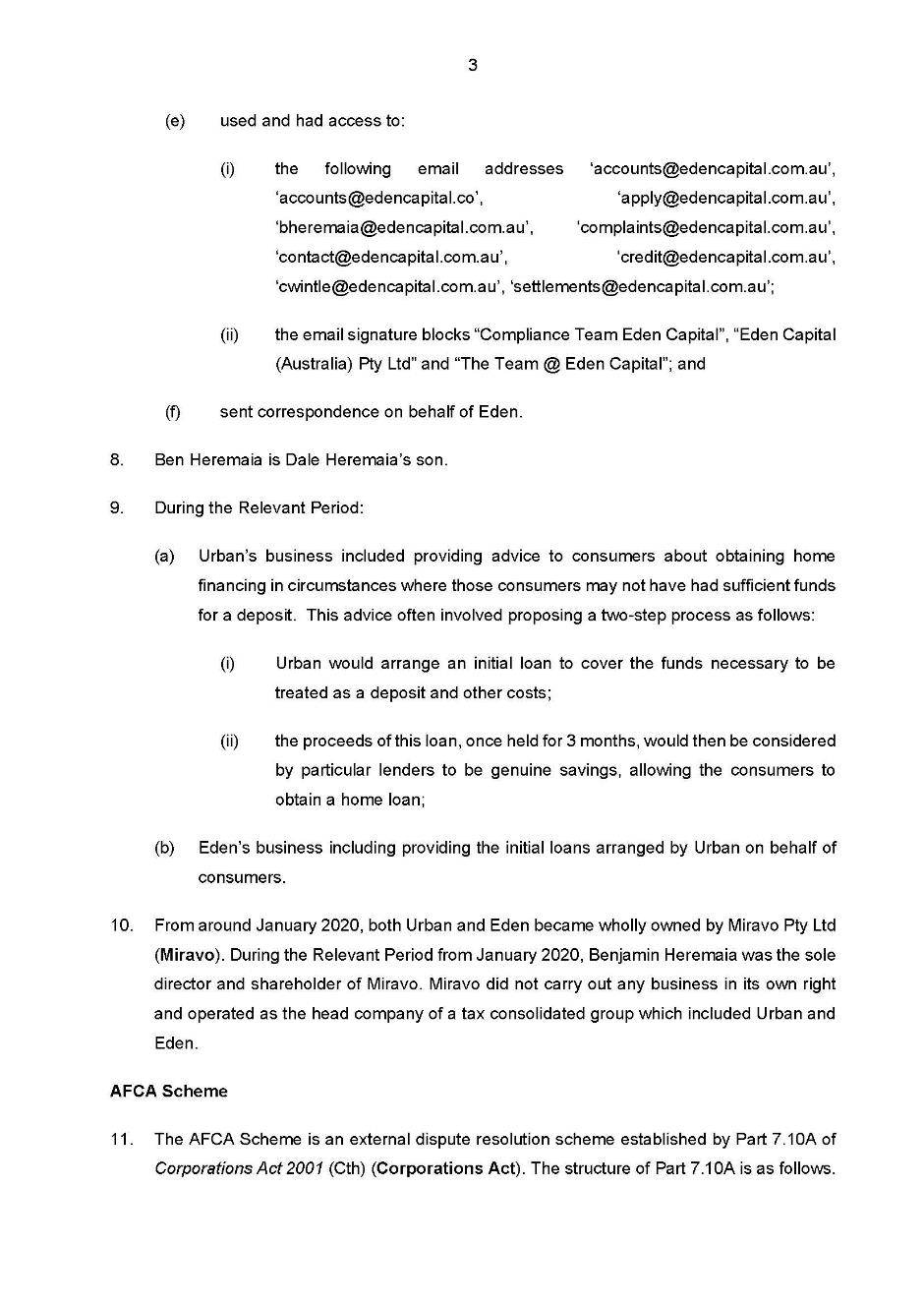

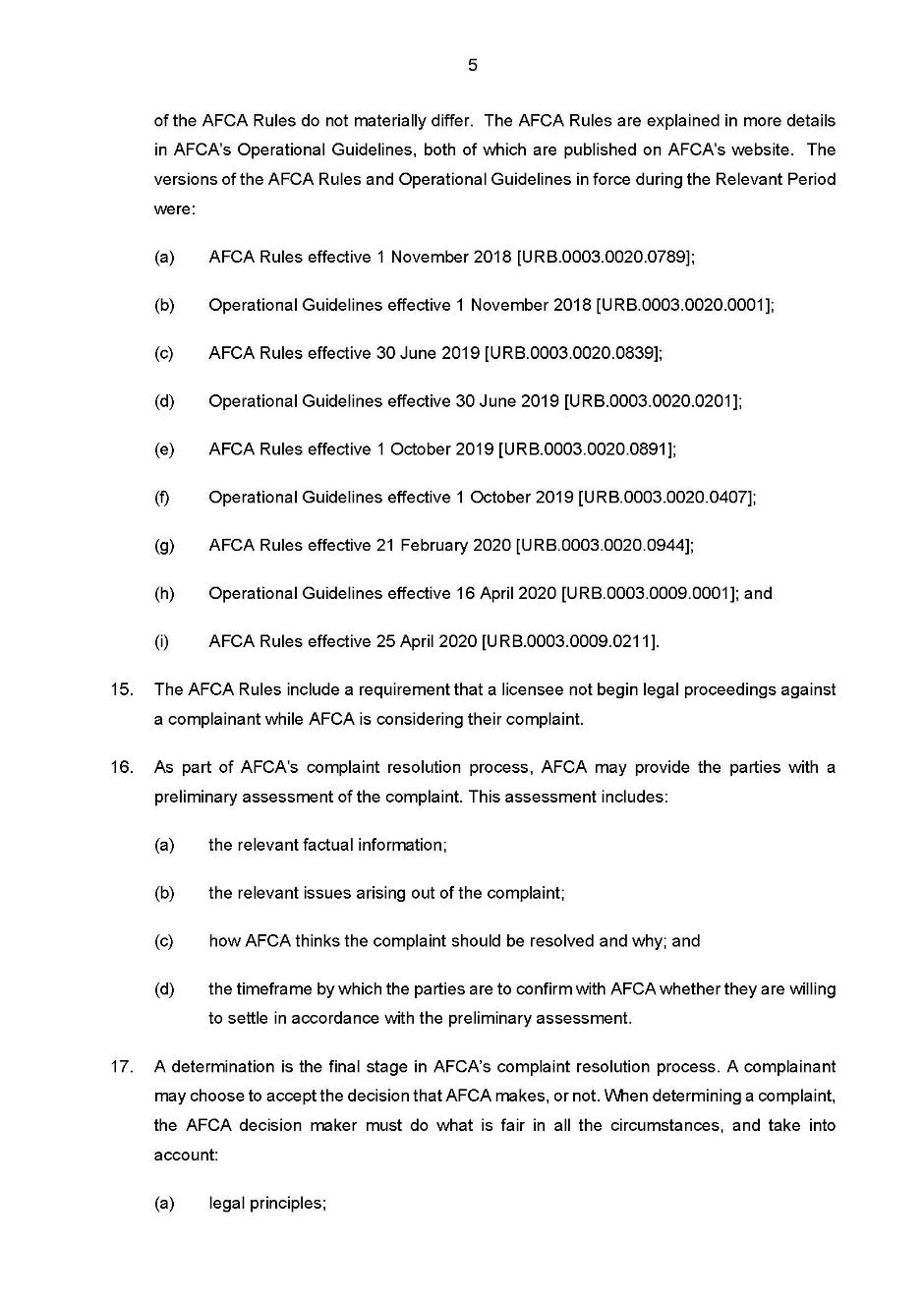
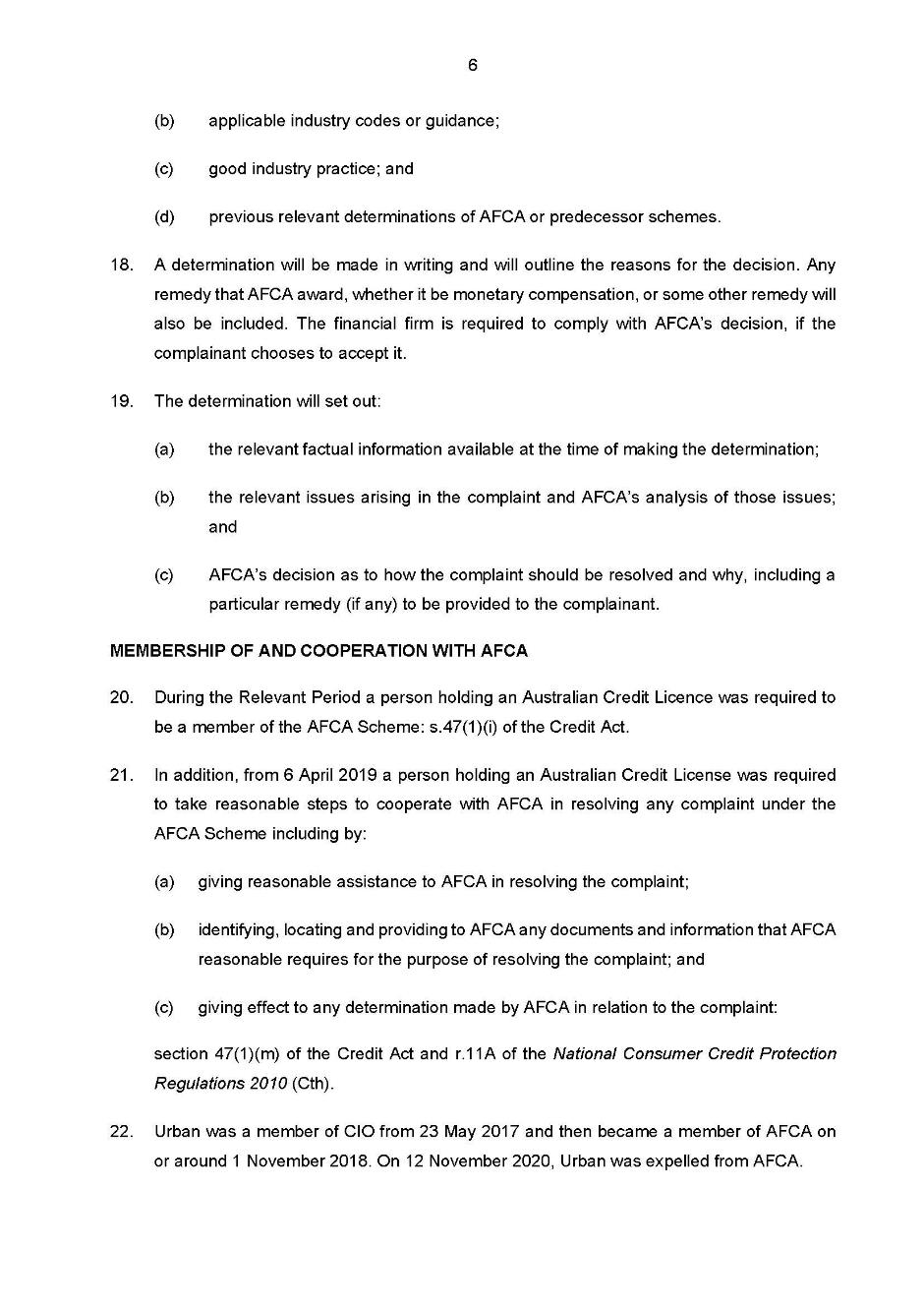
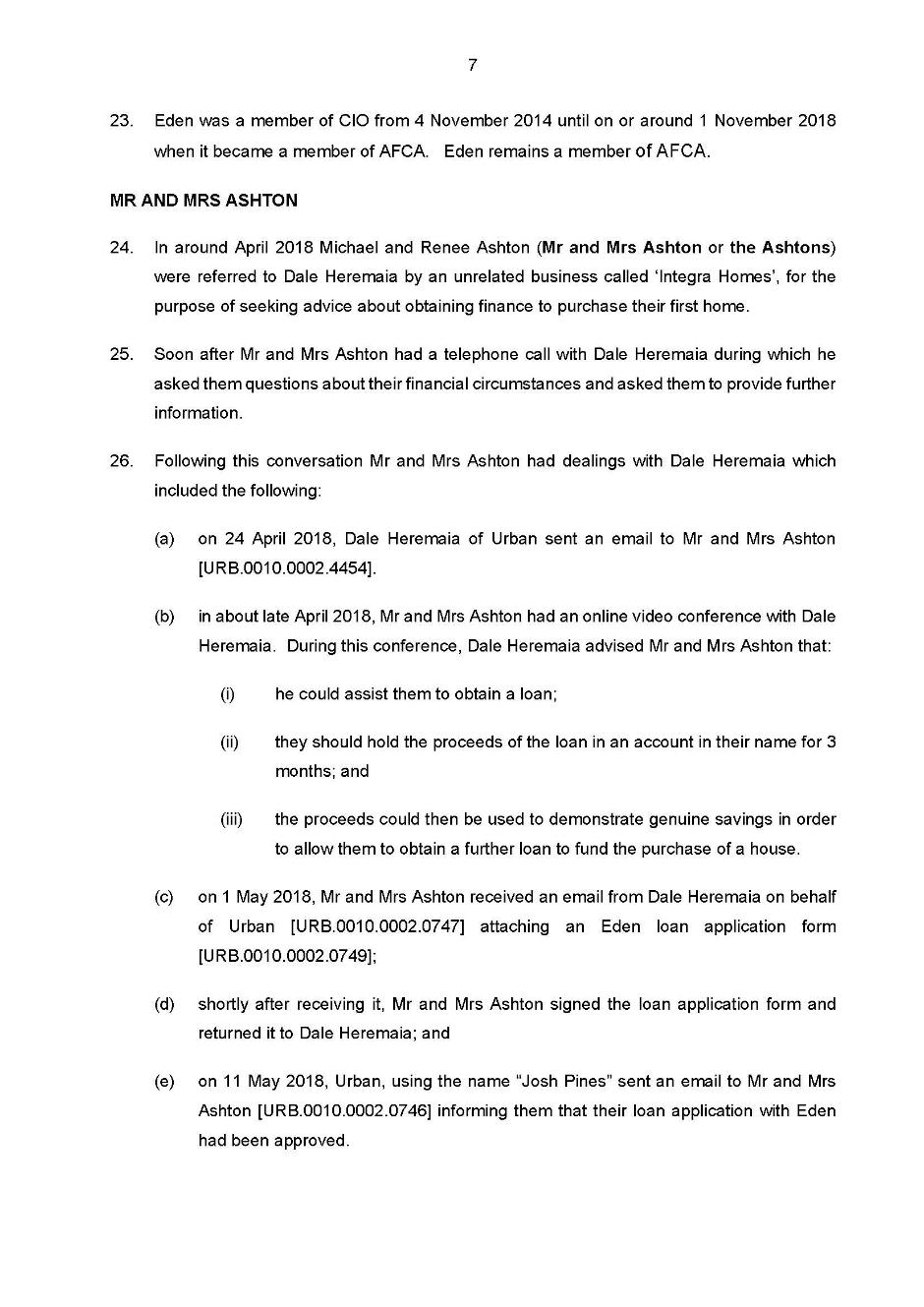
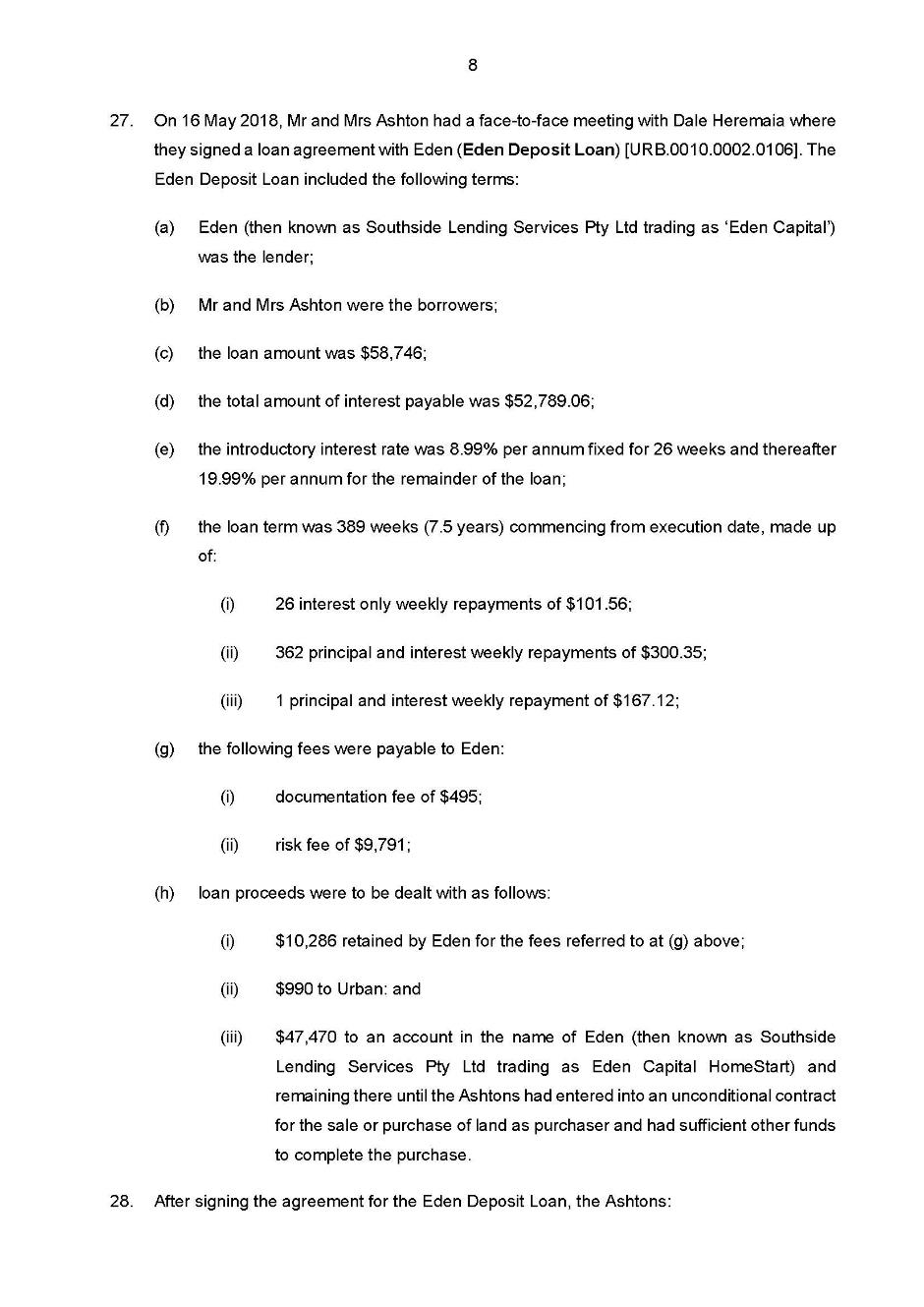
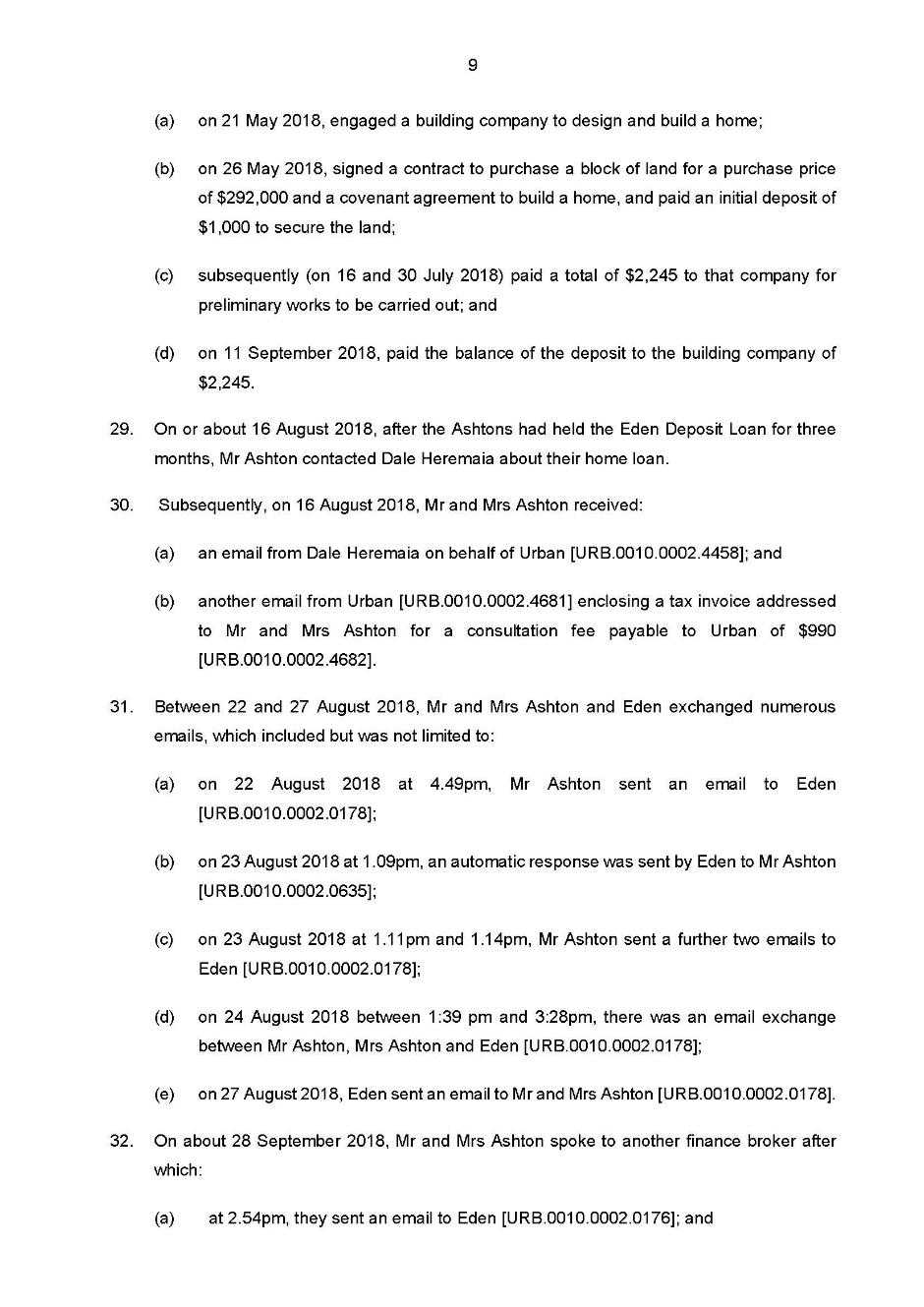
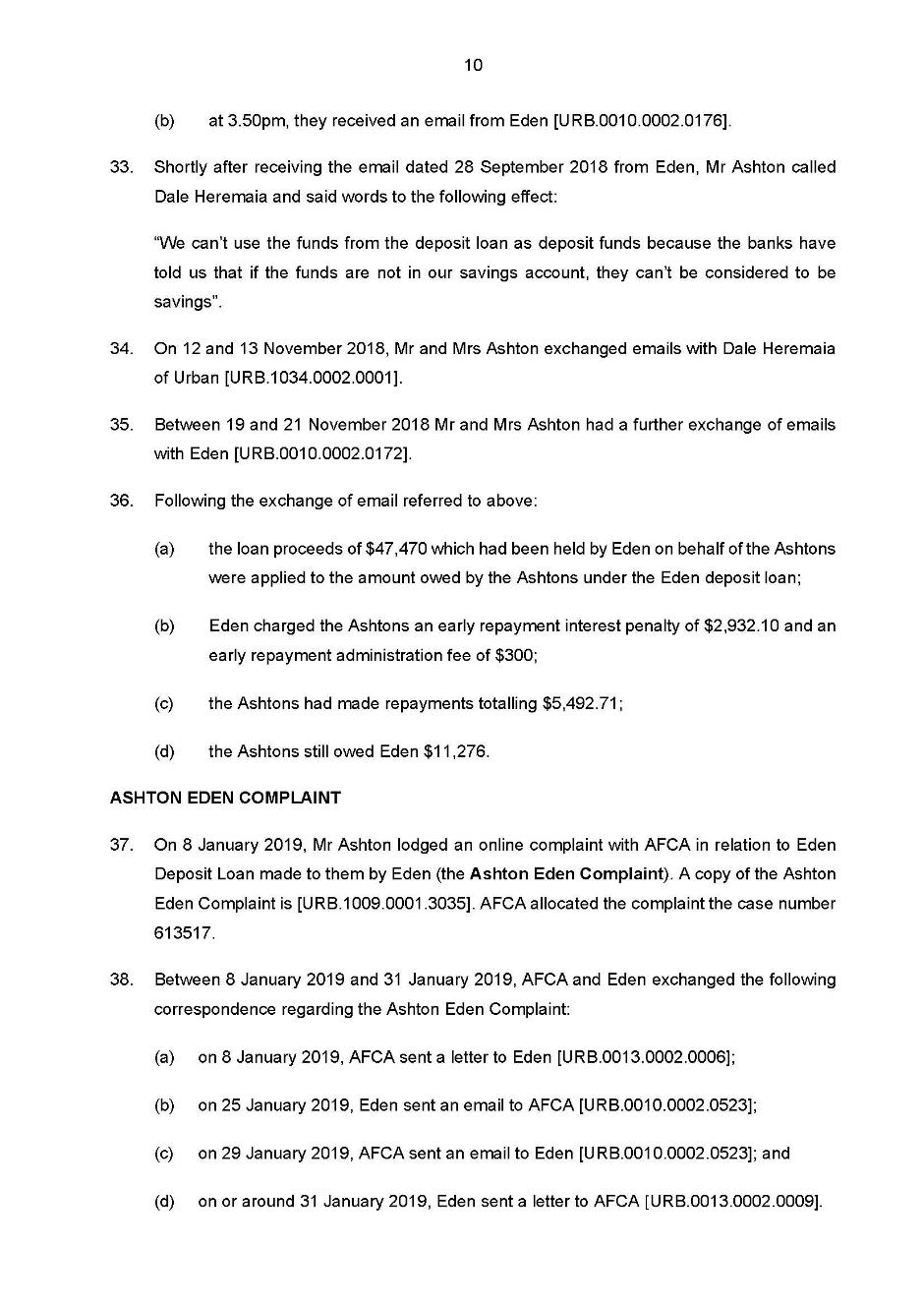
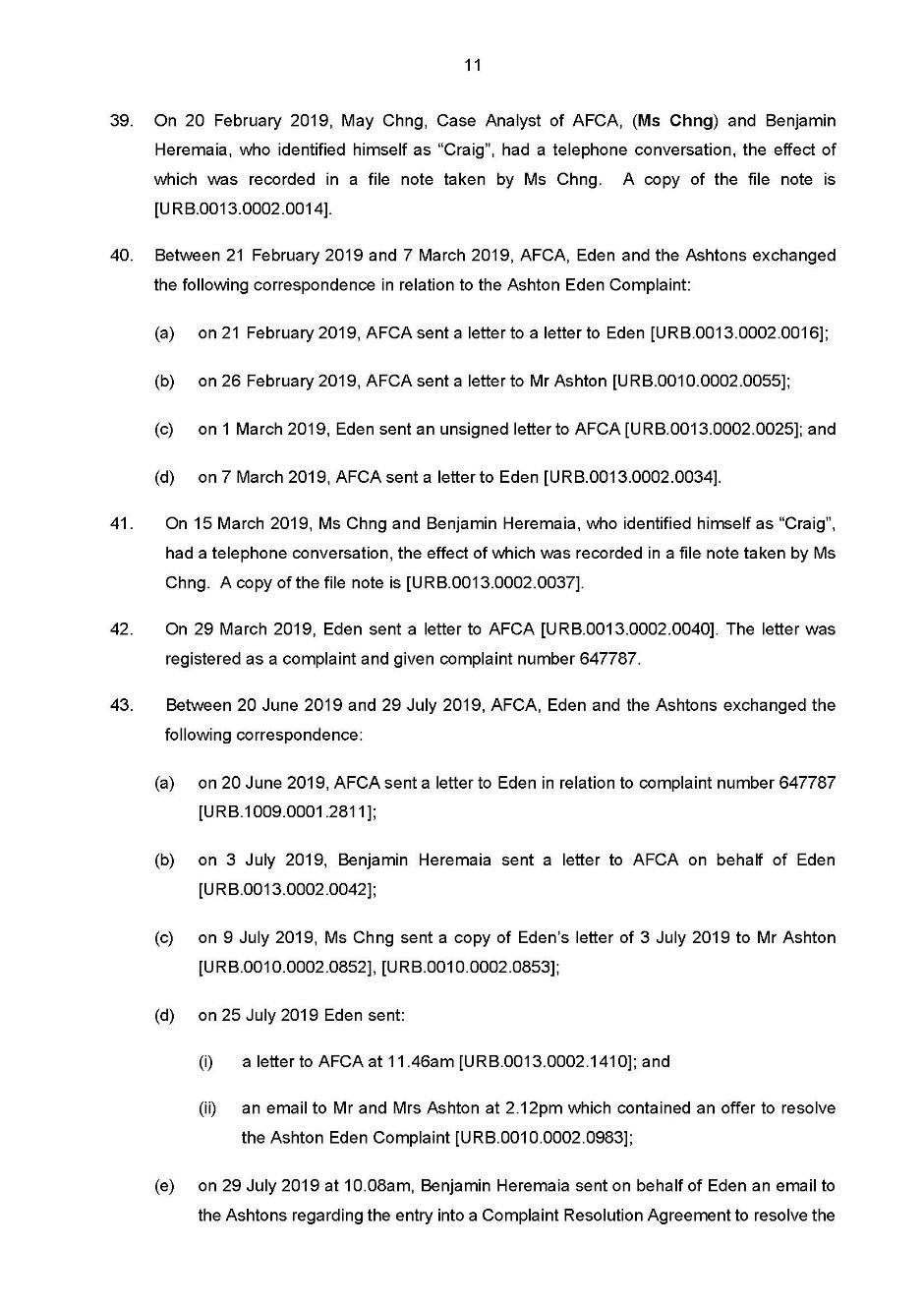
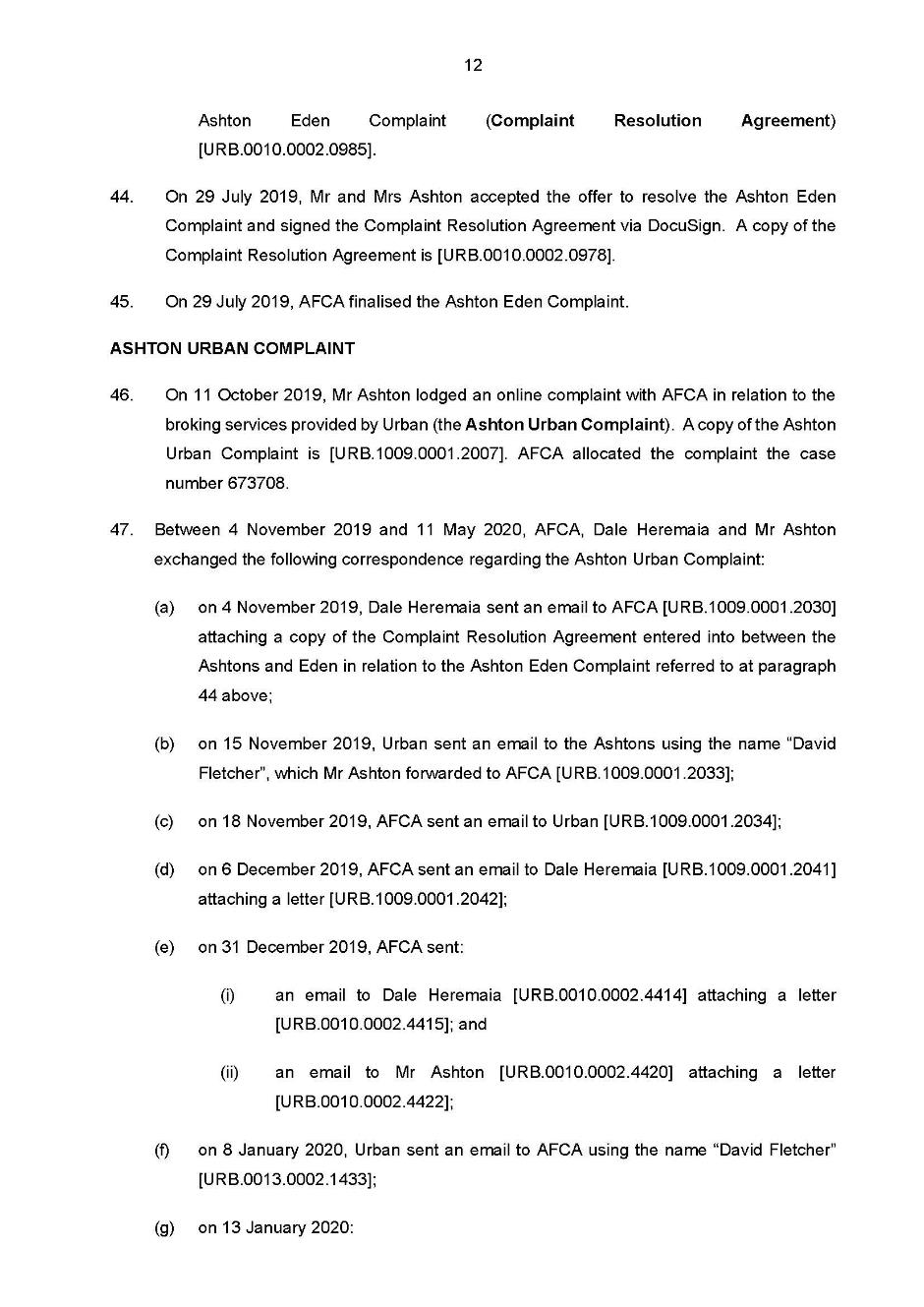
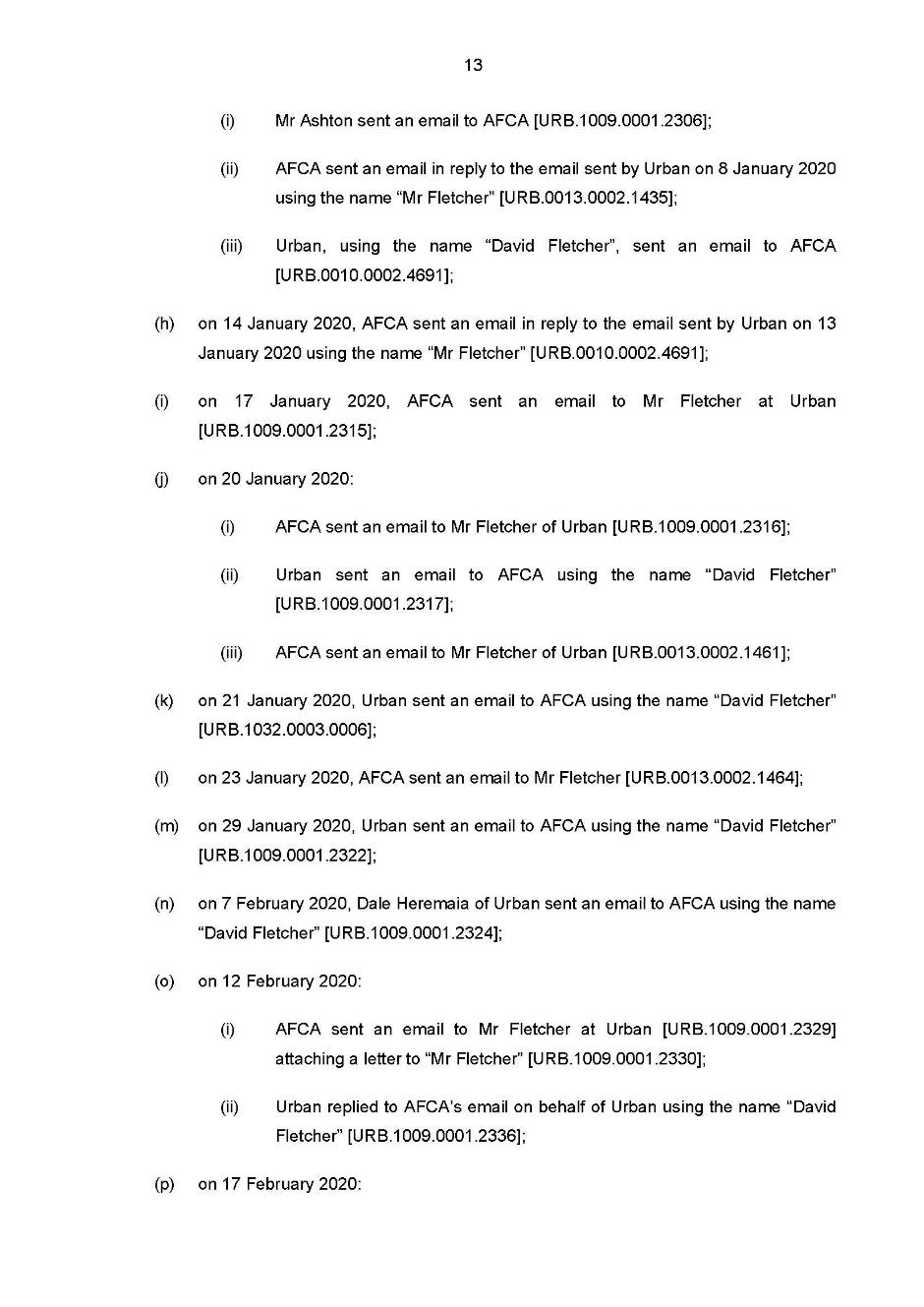
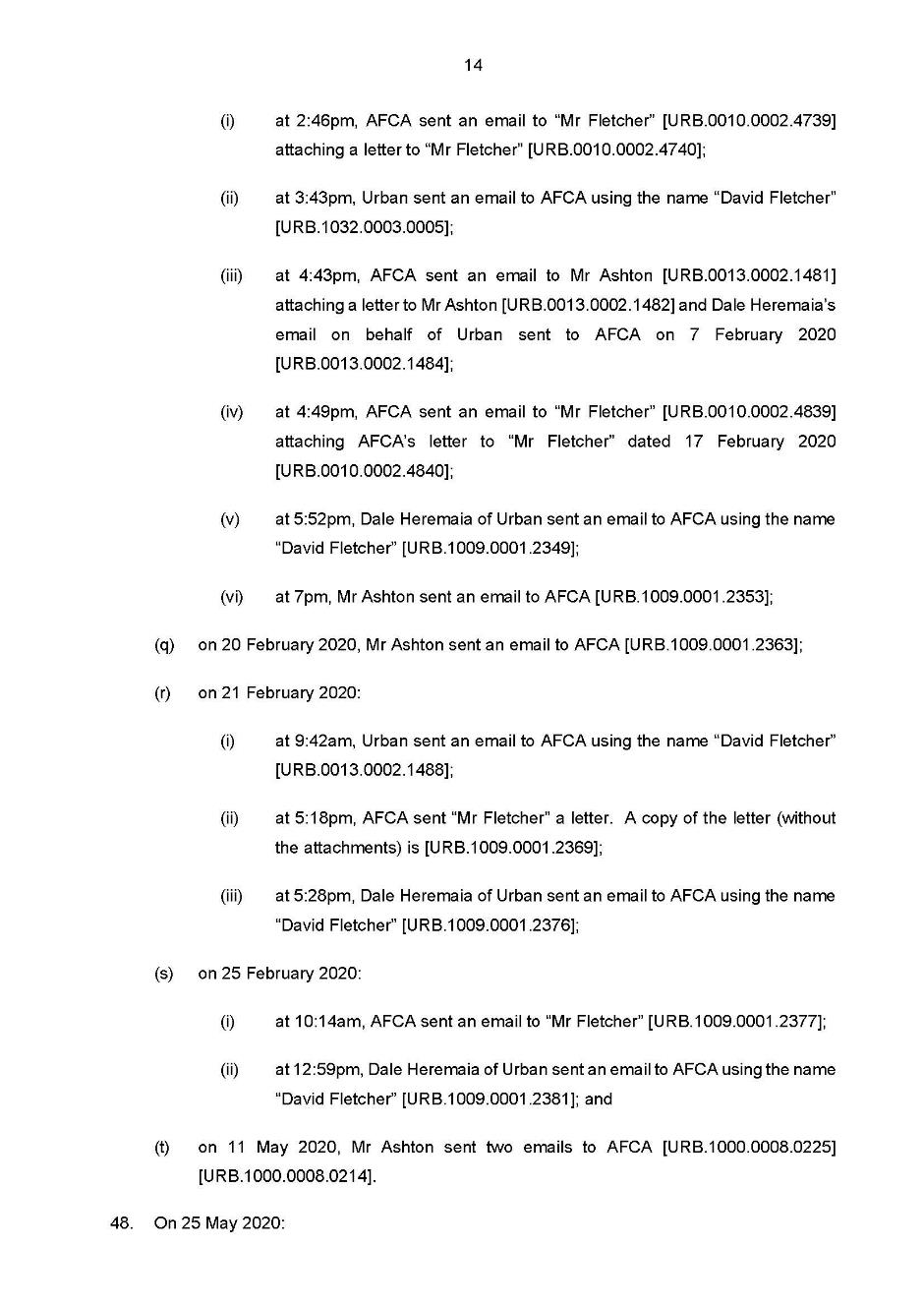
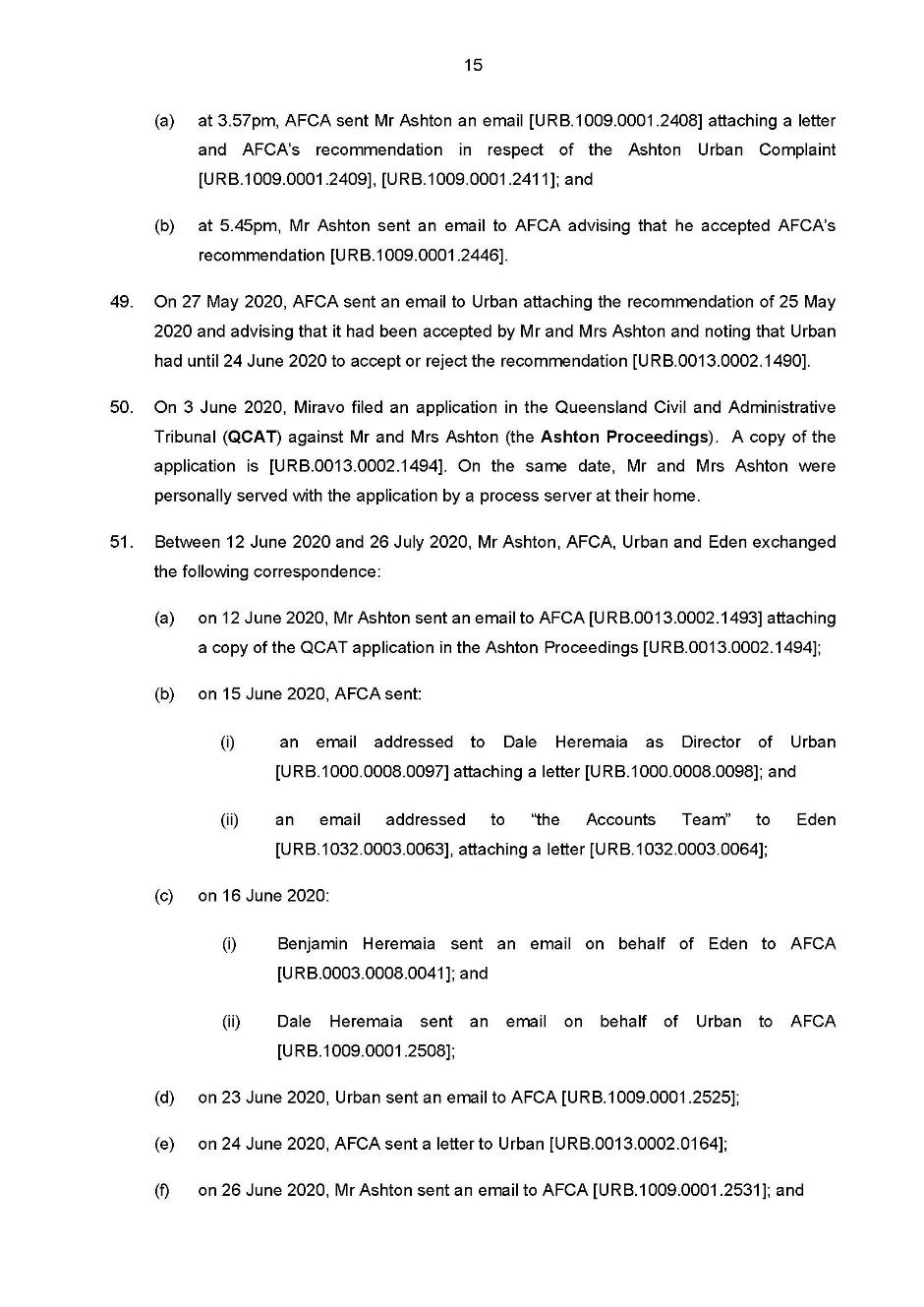
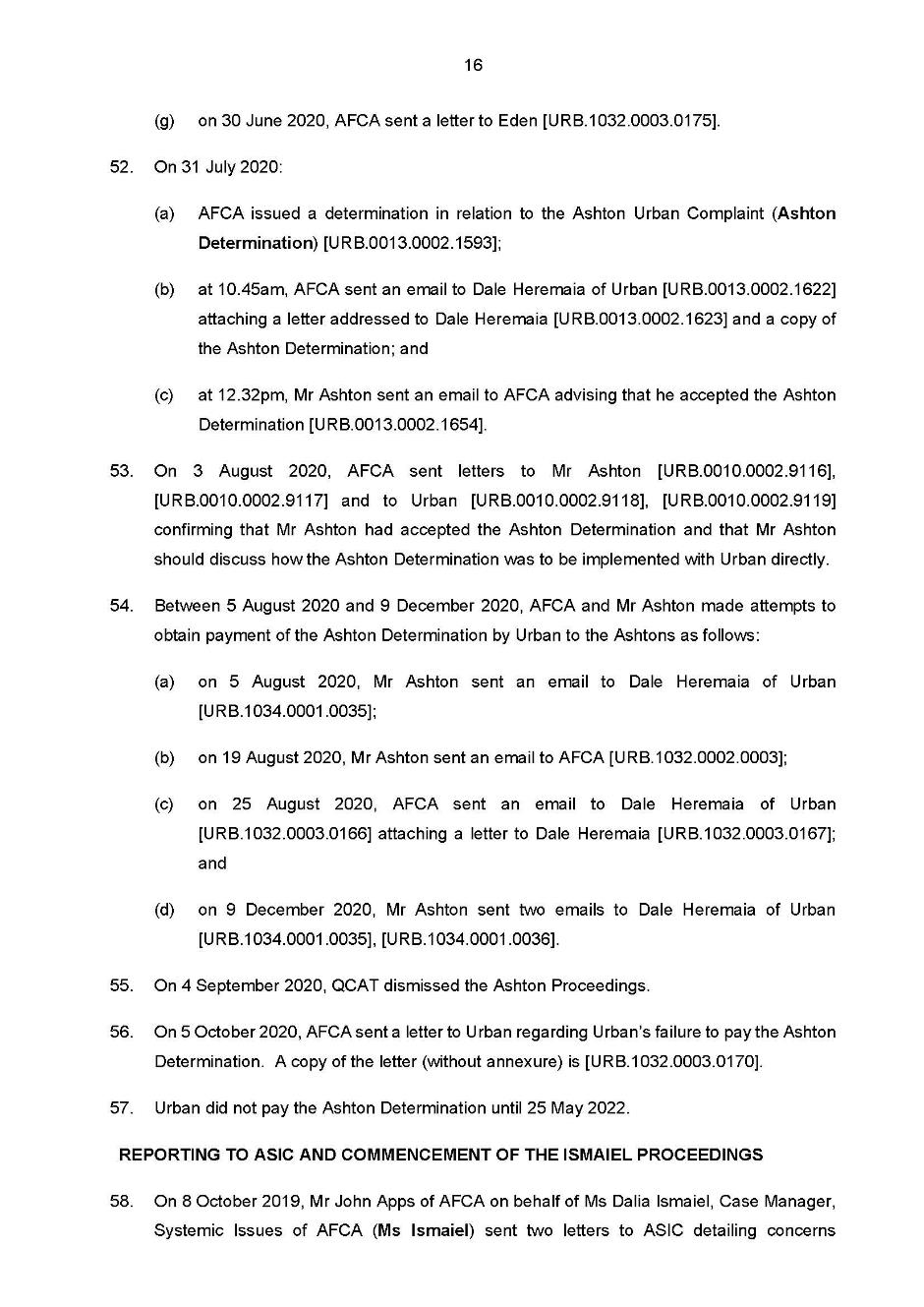
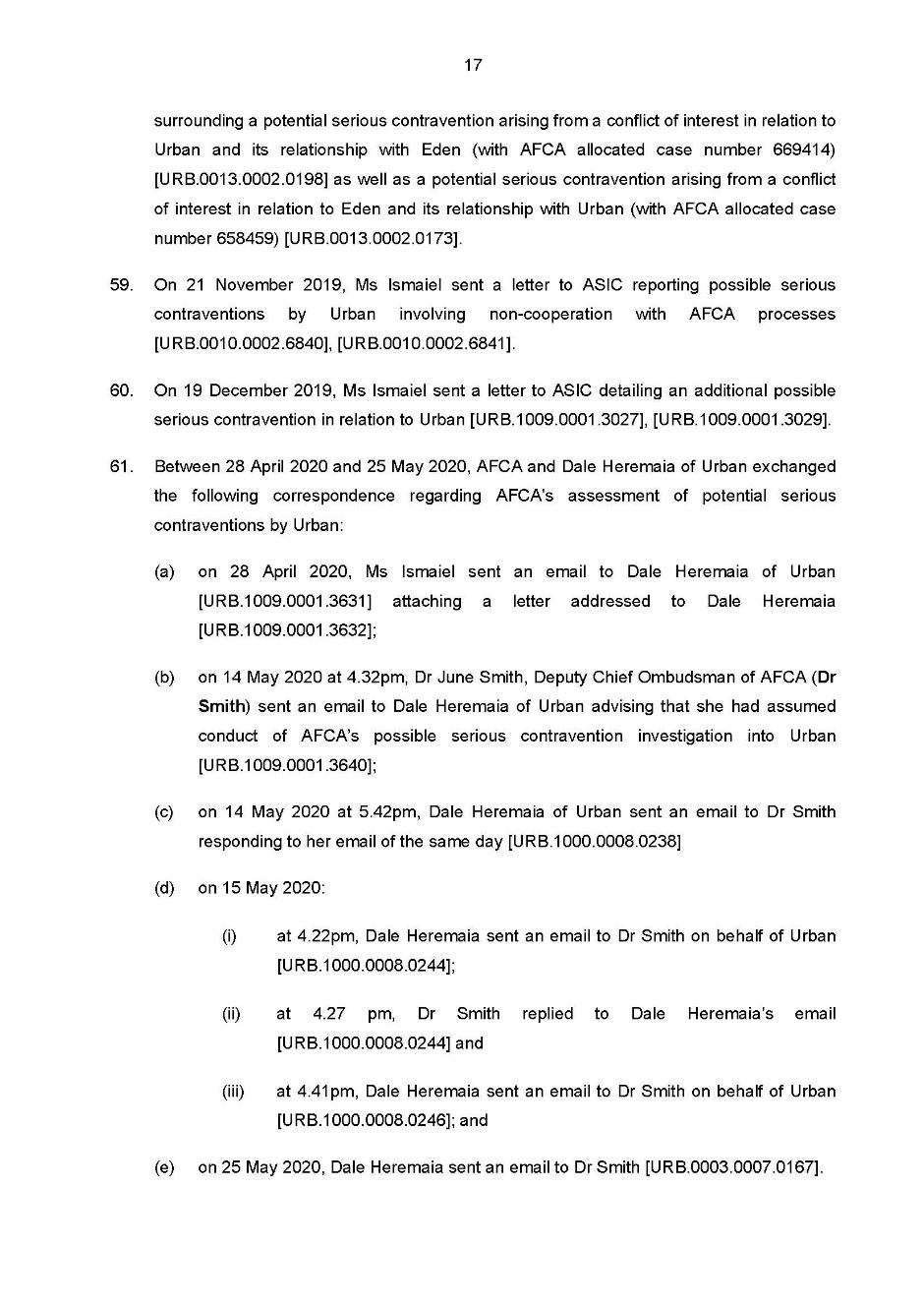
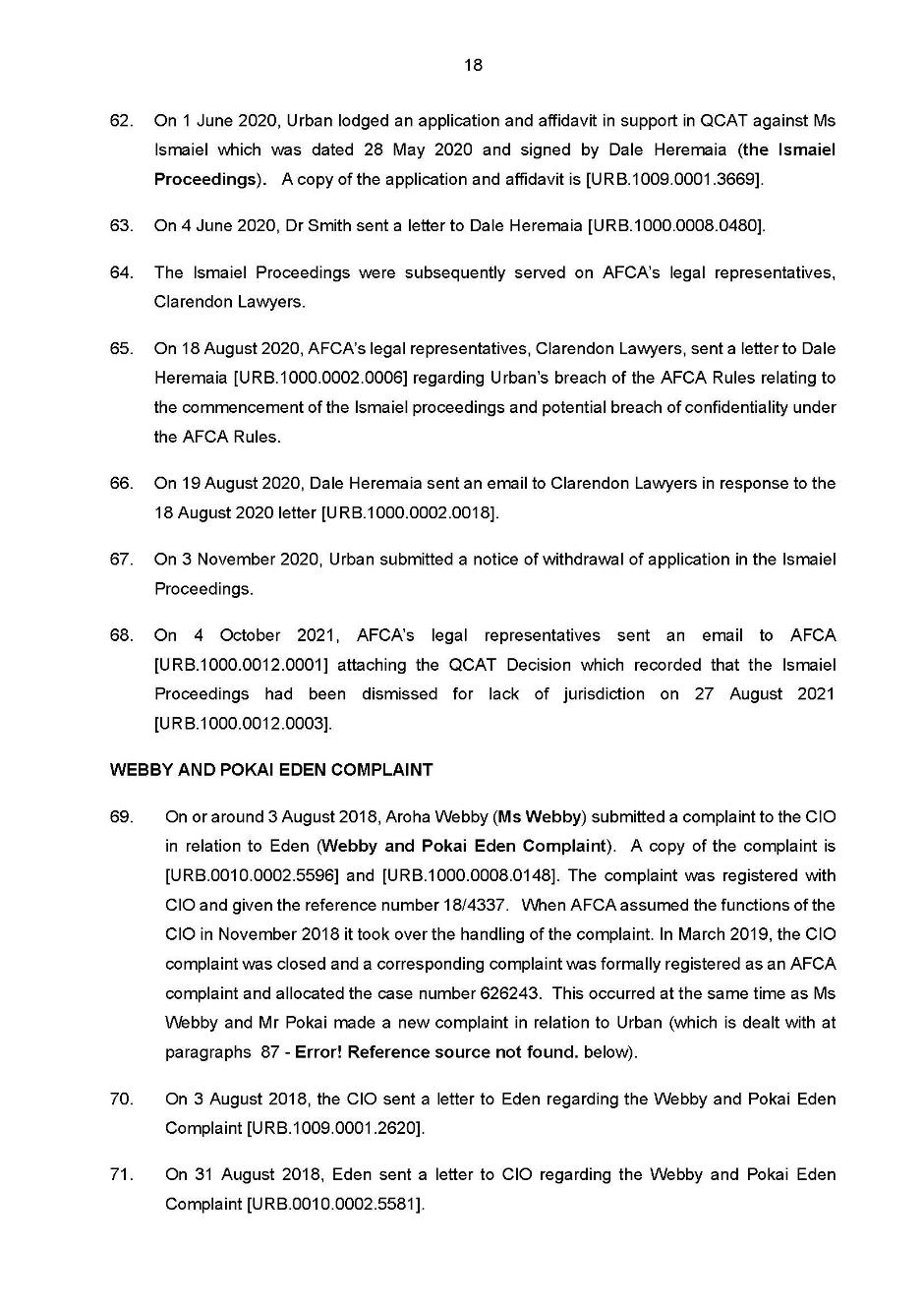
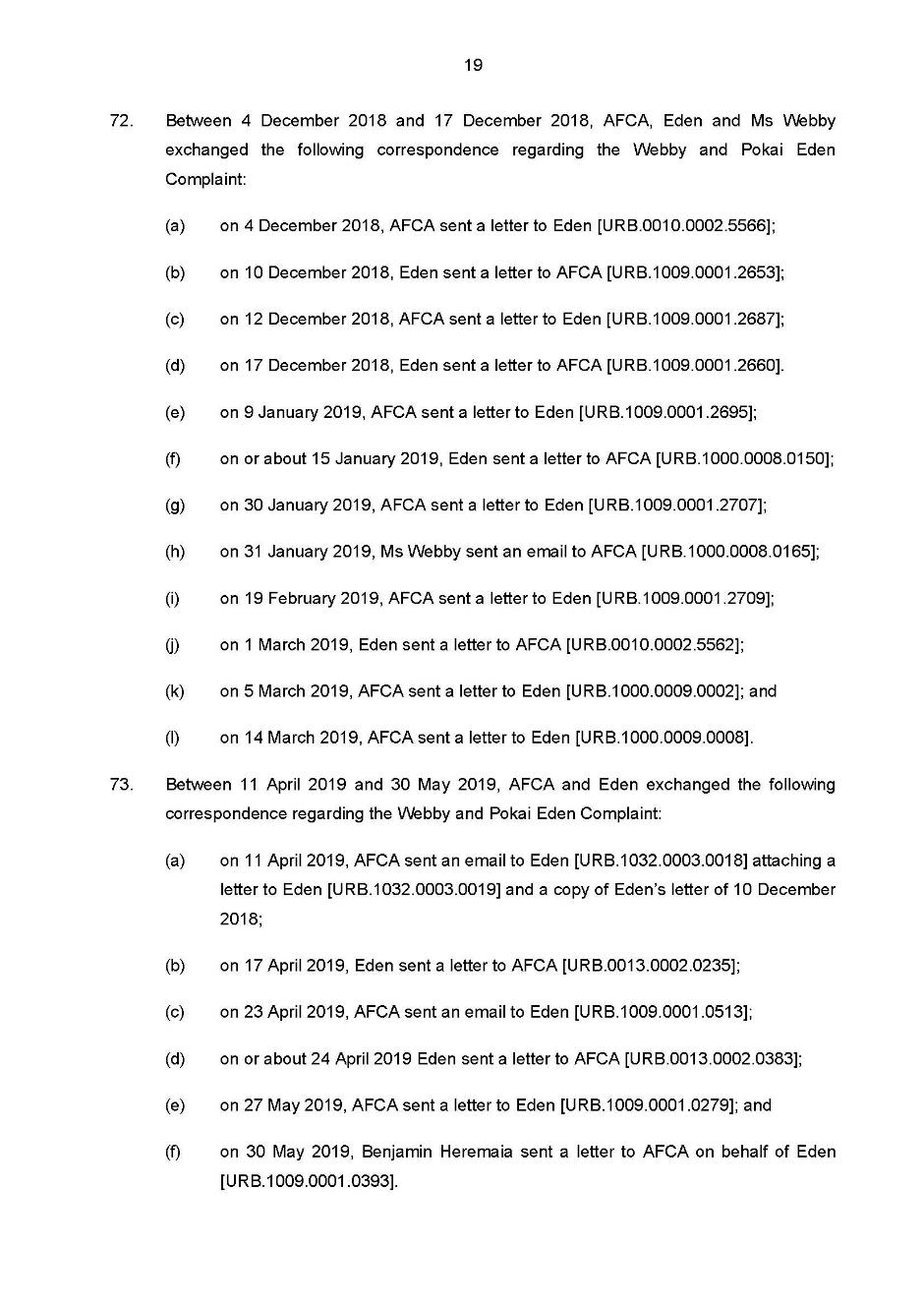
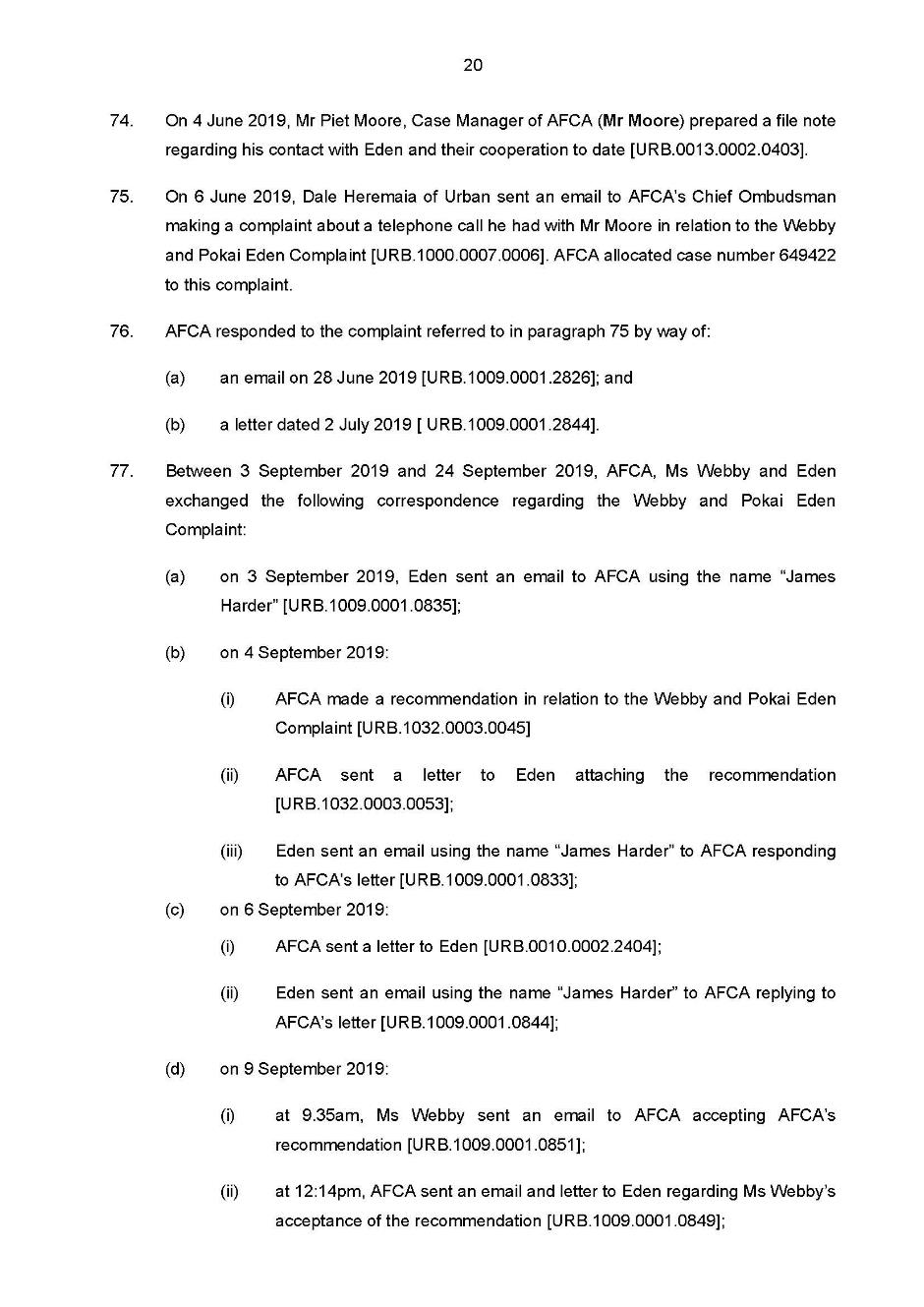
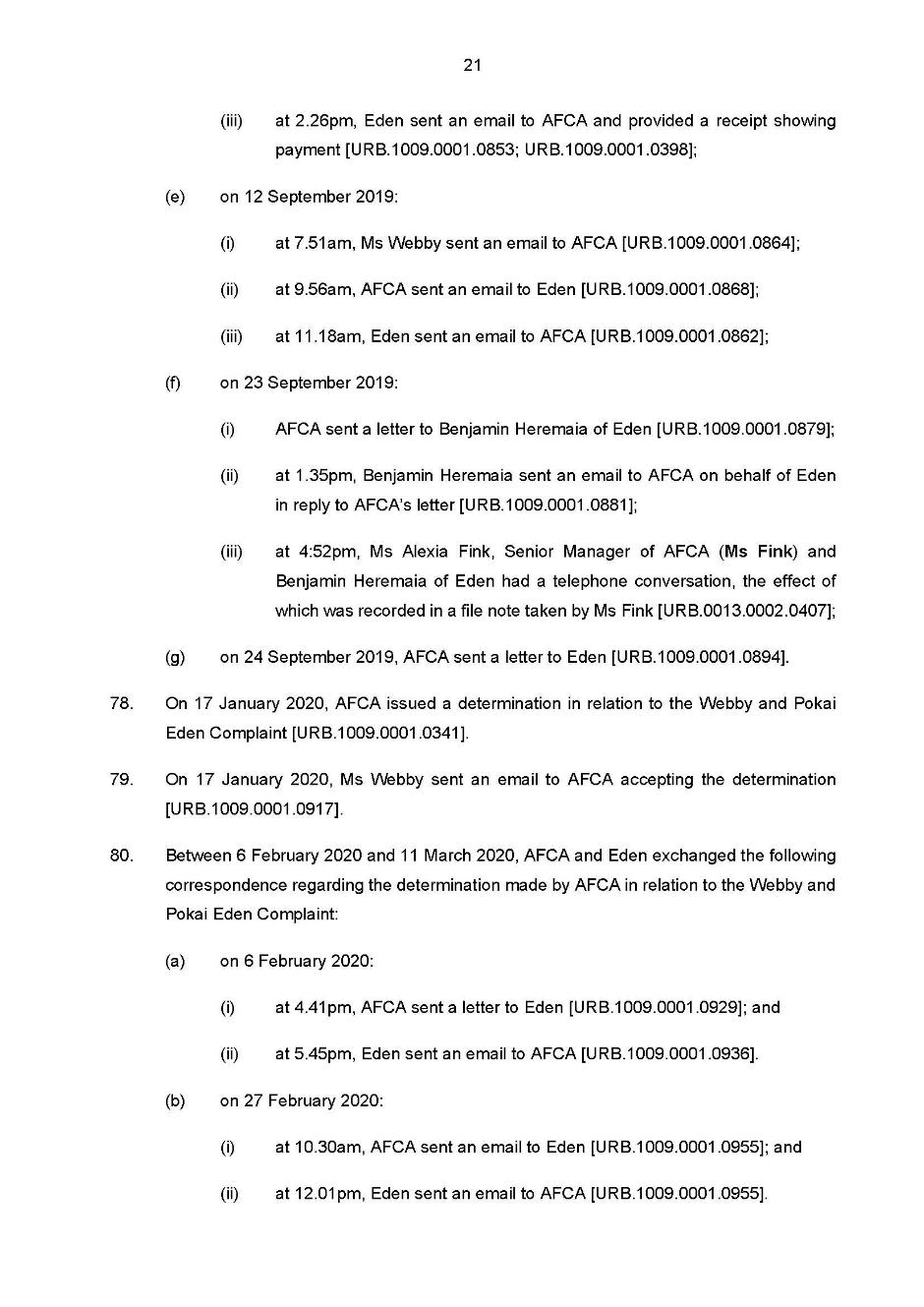
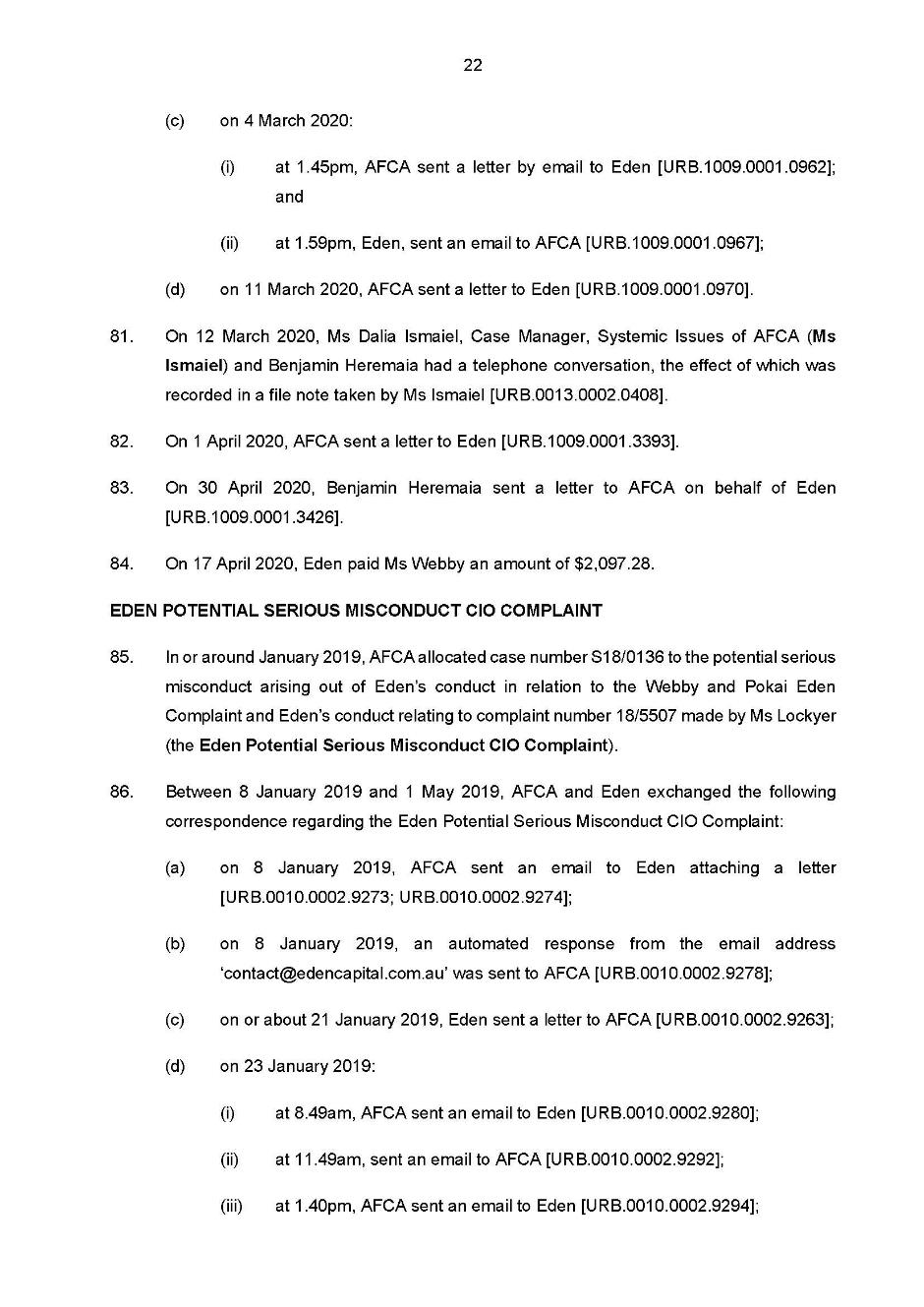
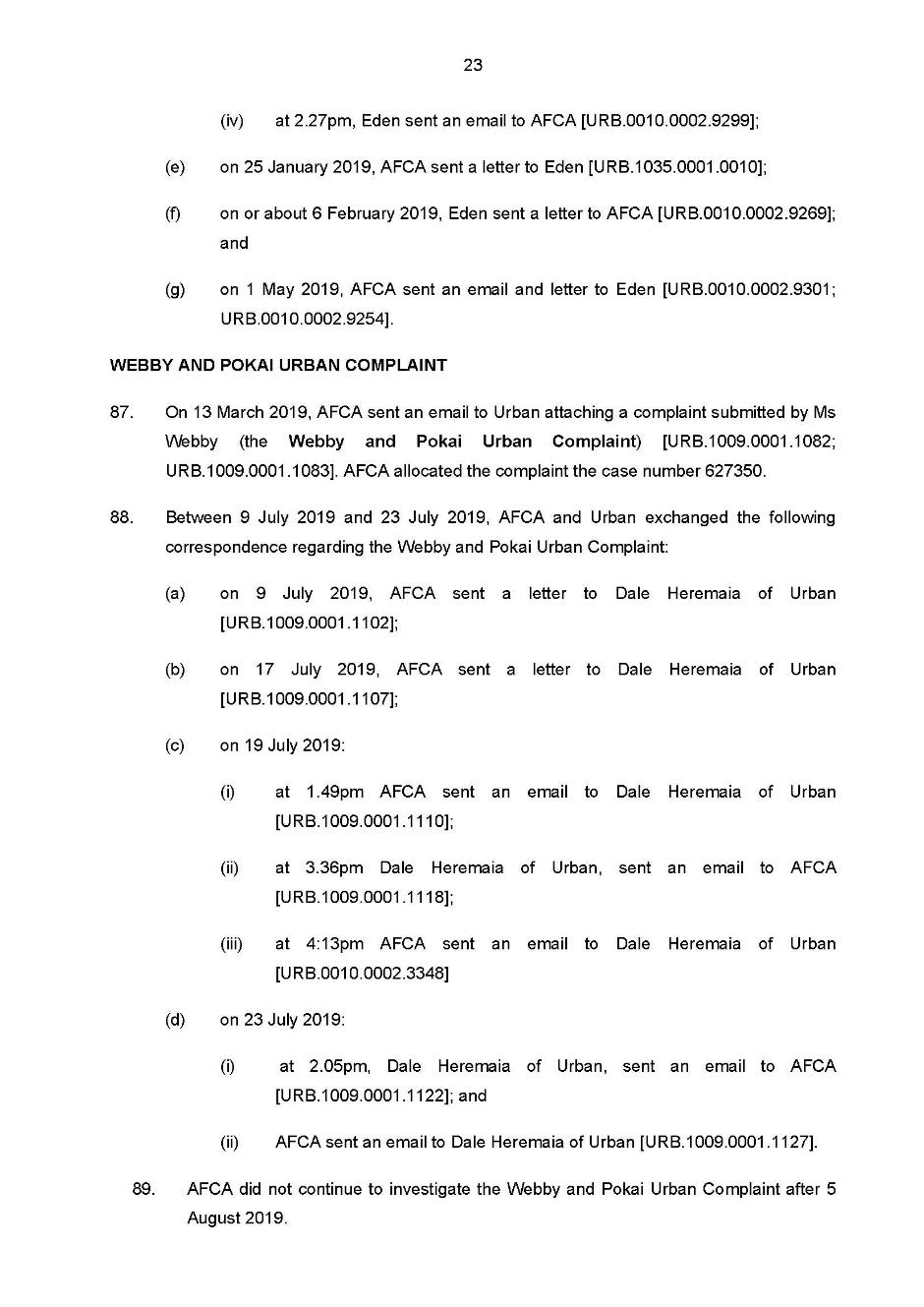
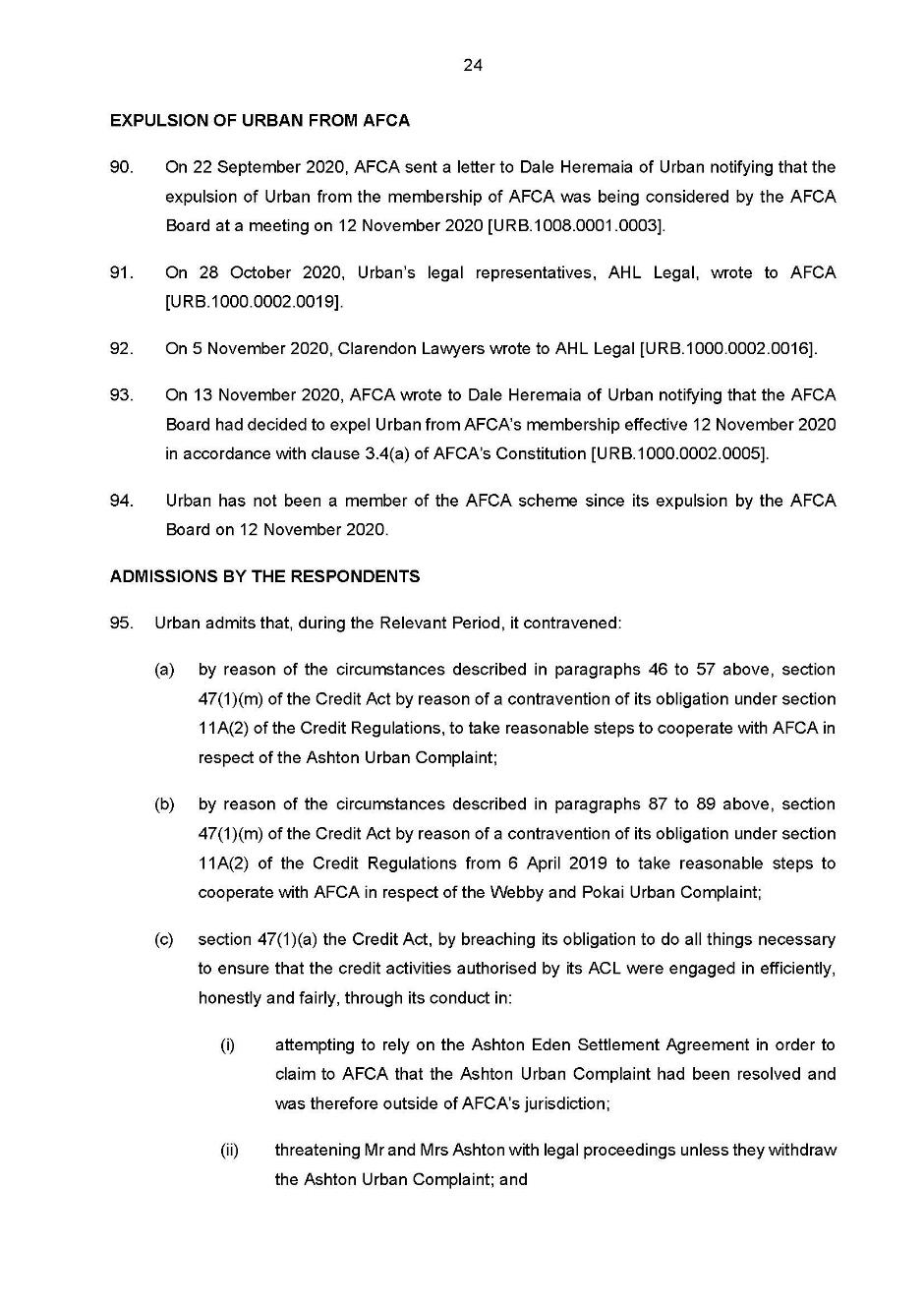
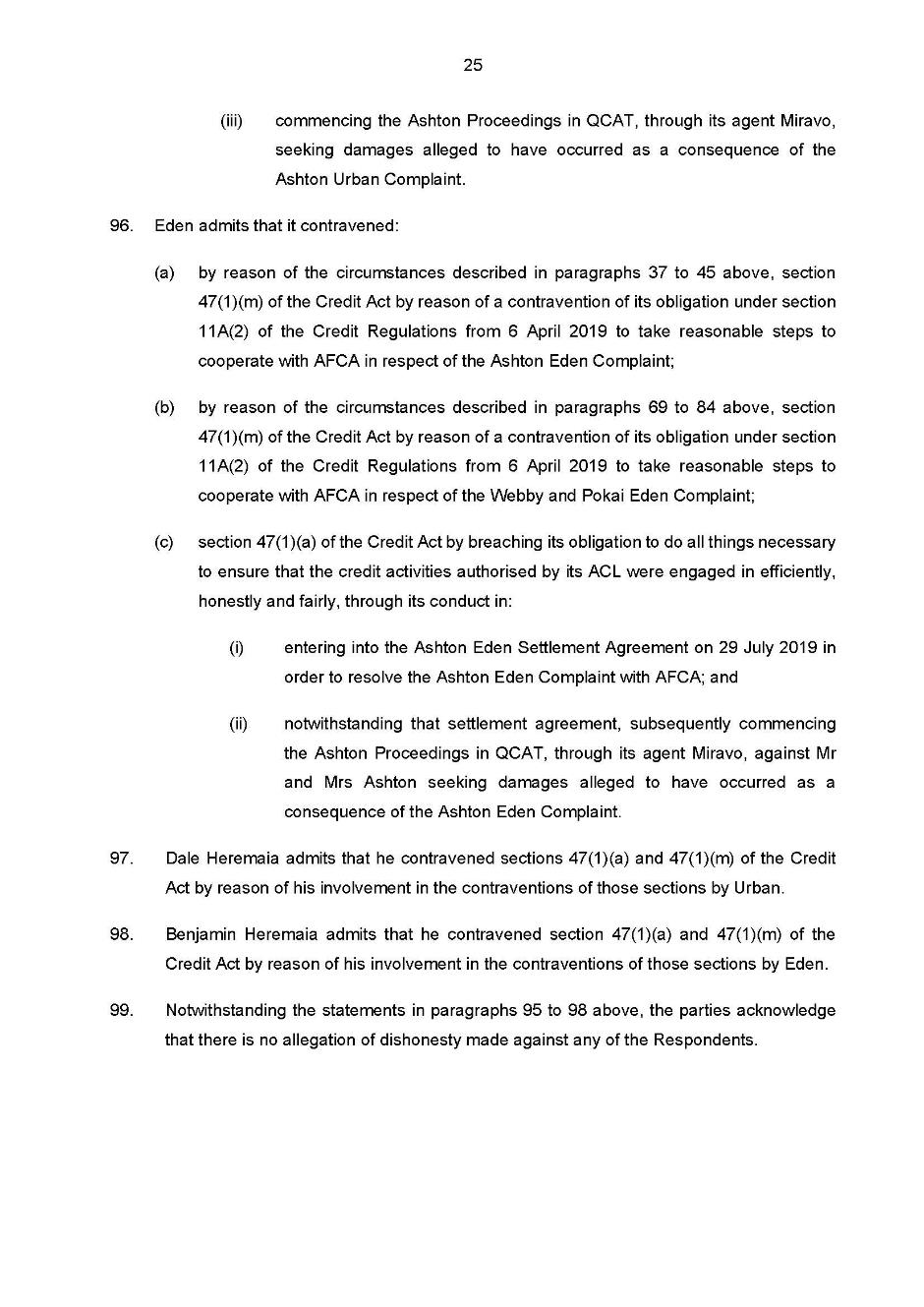
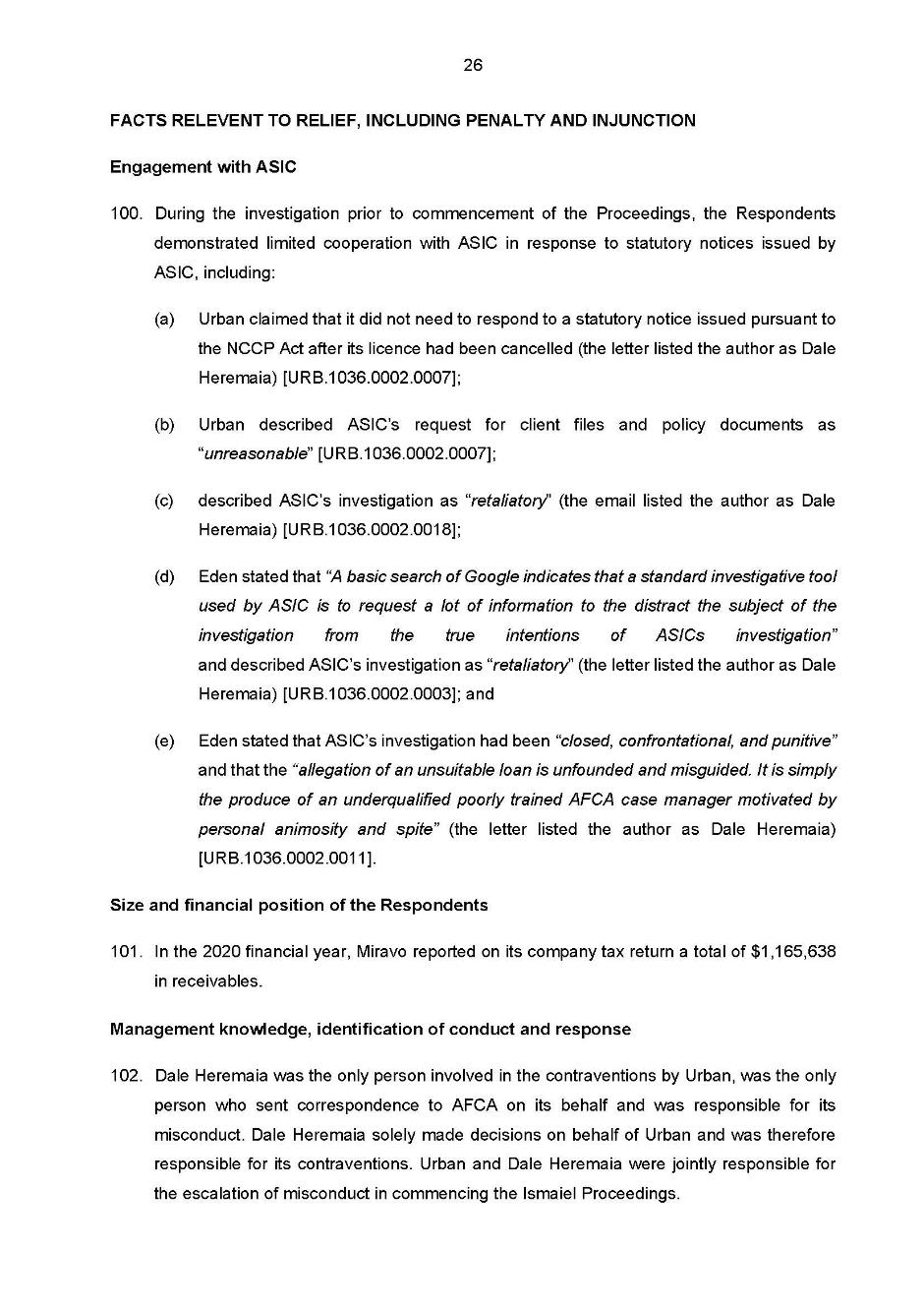
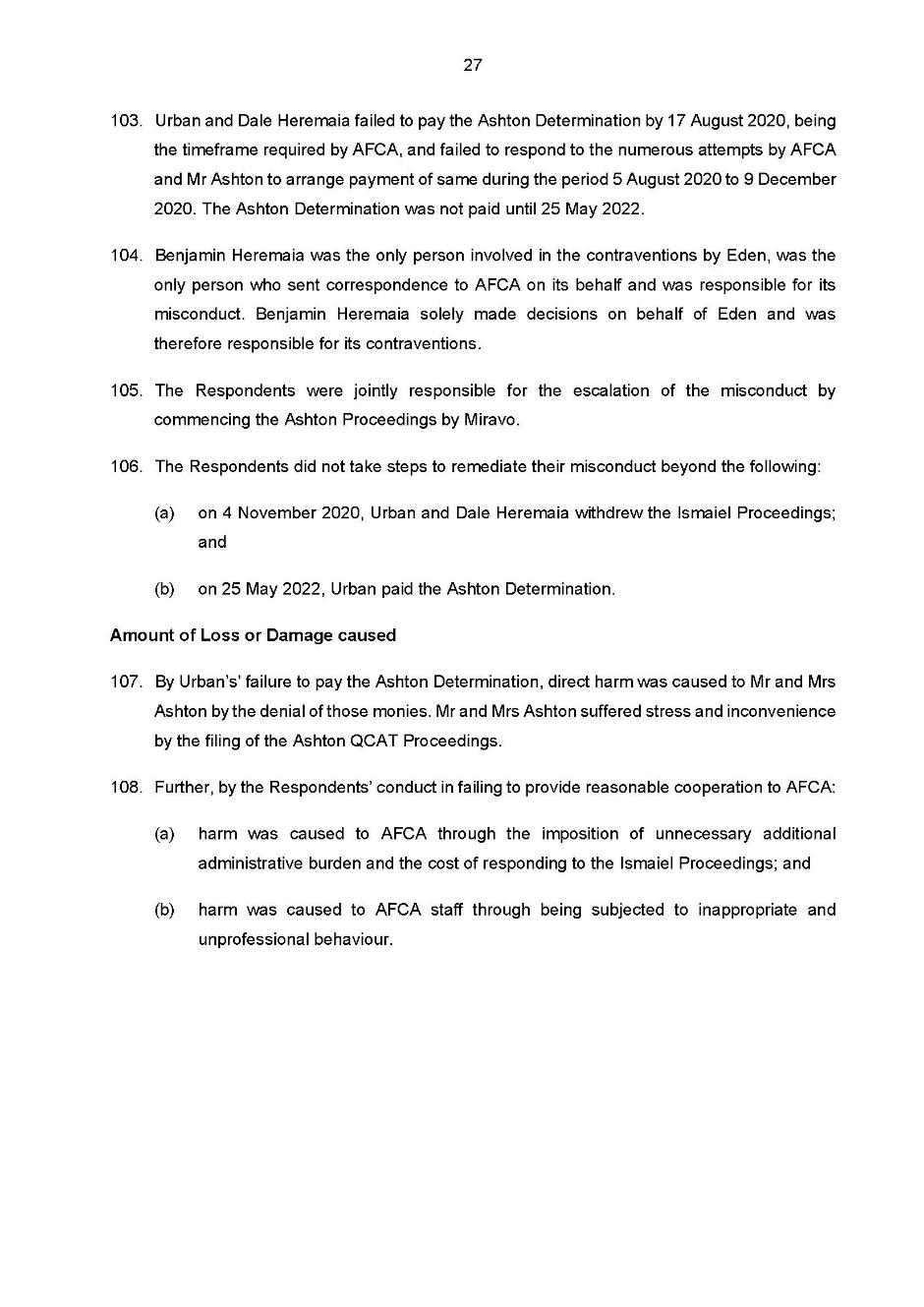
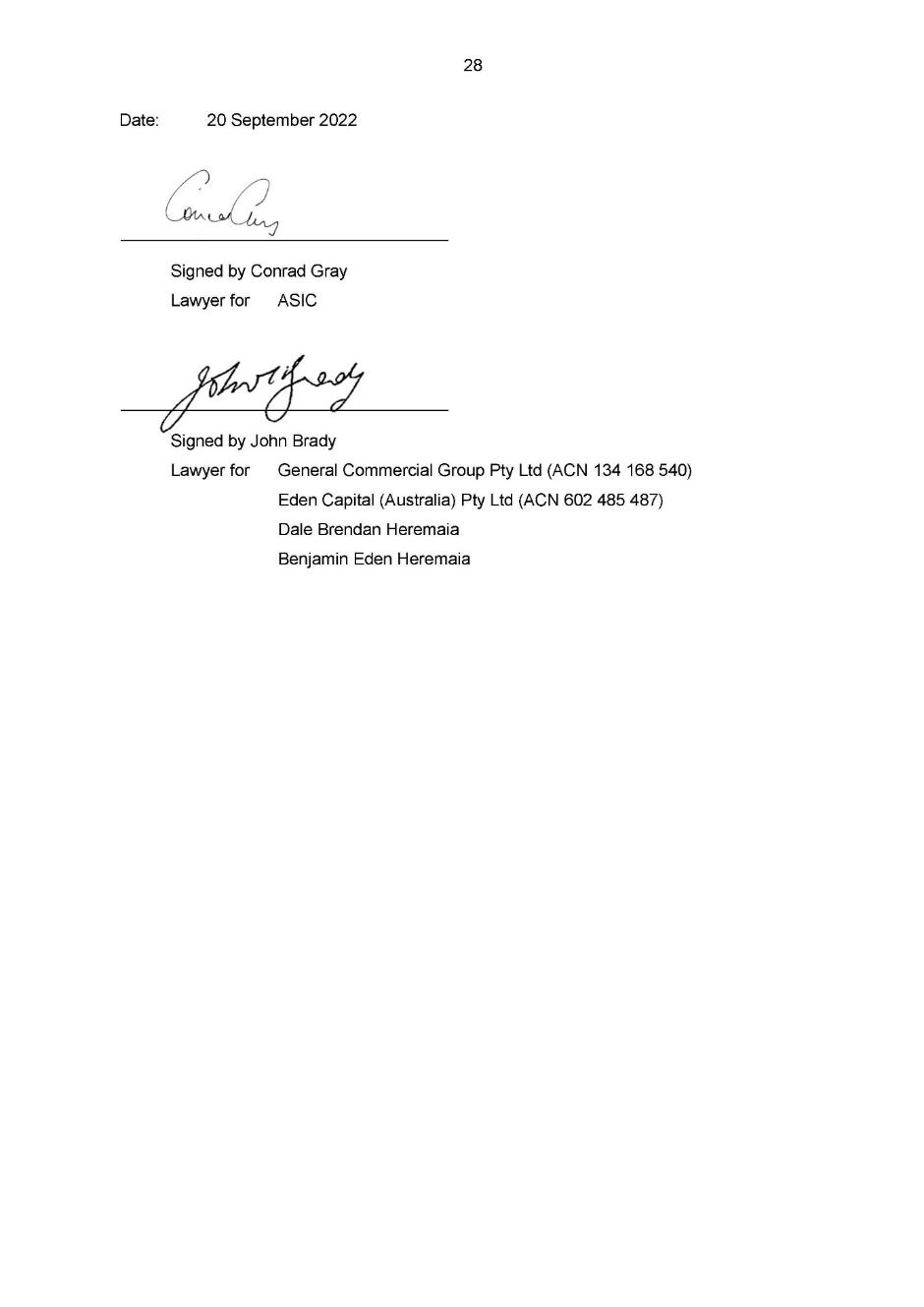
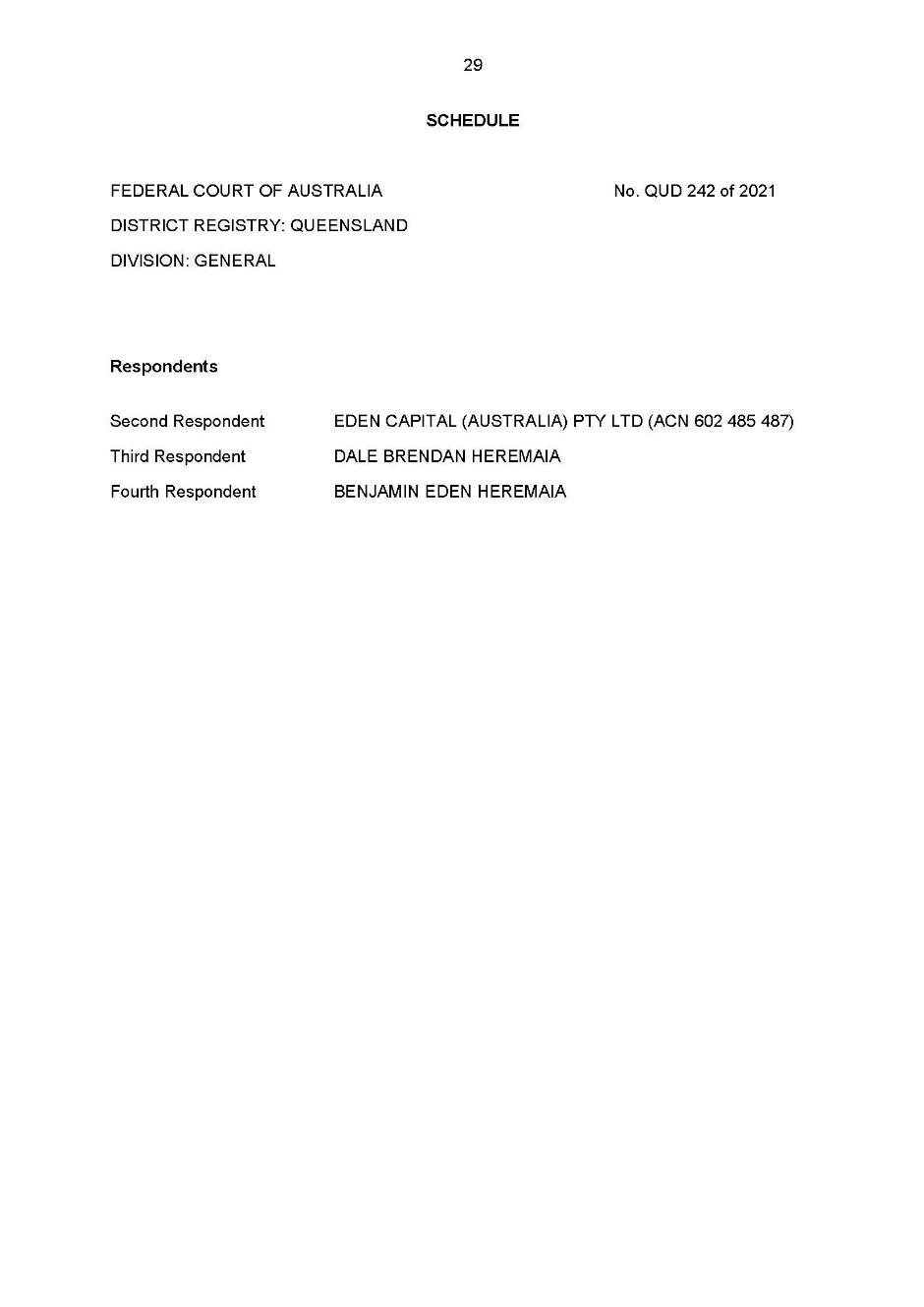
QUD 242 of 2021 | |
BENJAMIN EDEN HEREMAIA |




